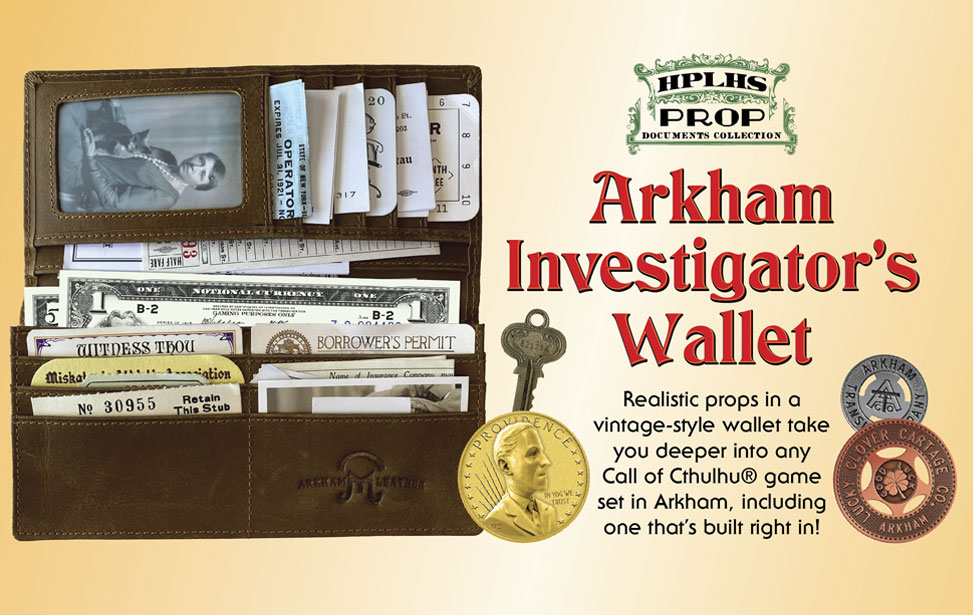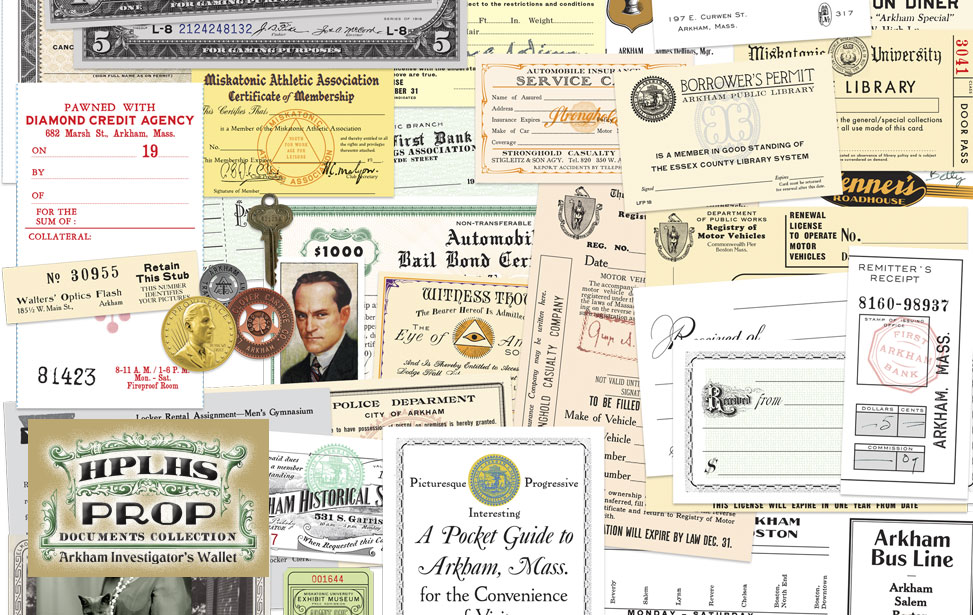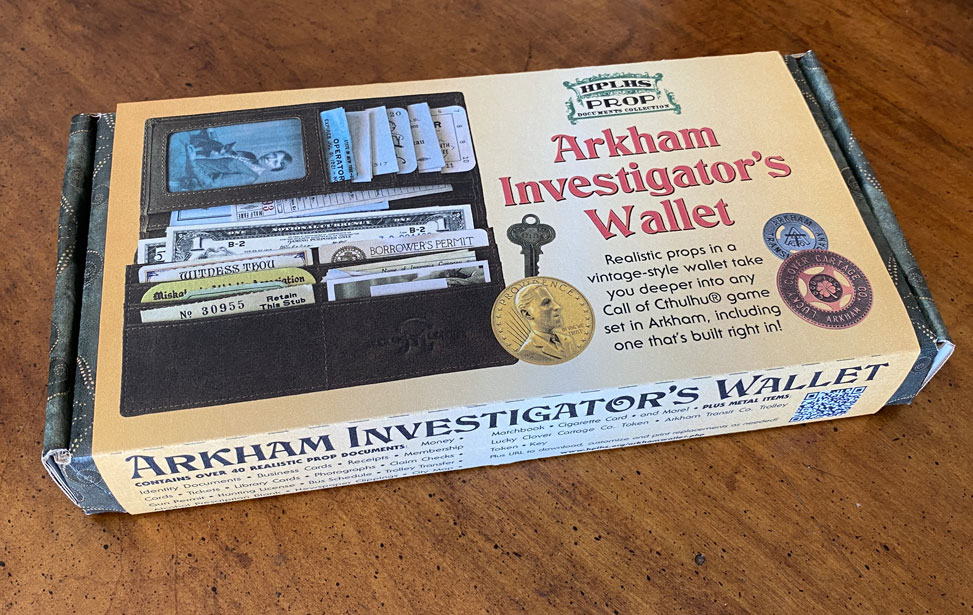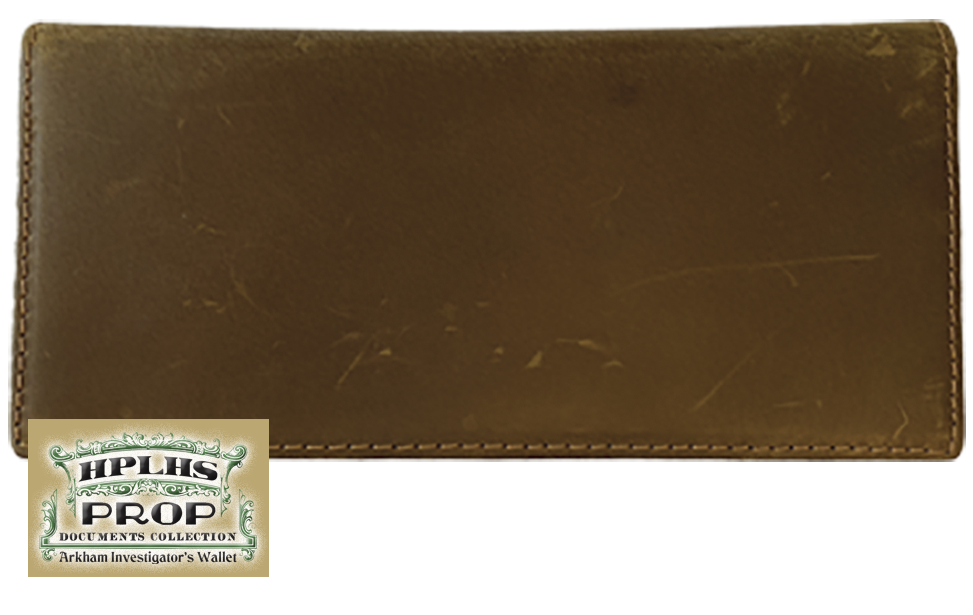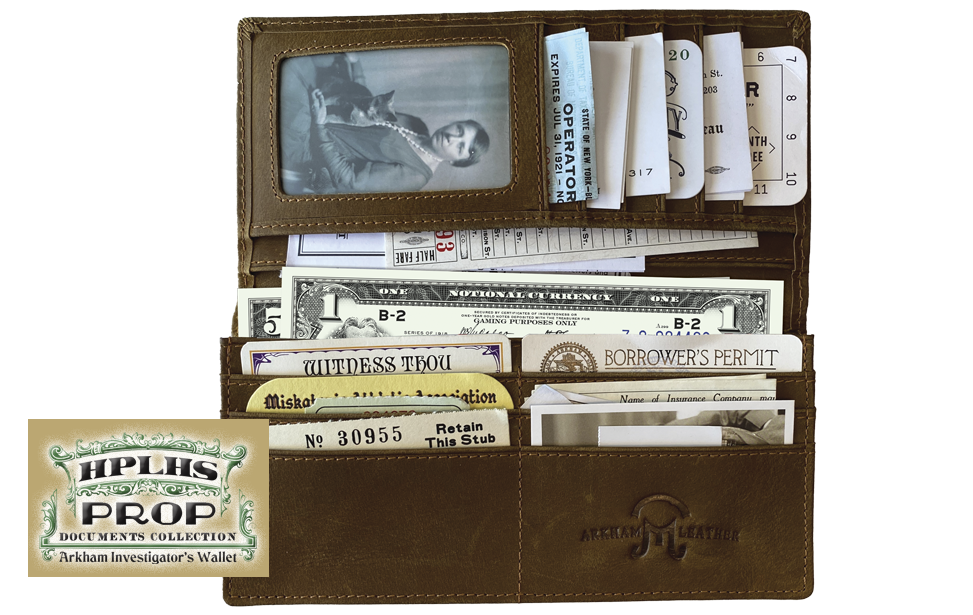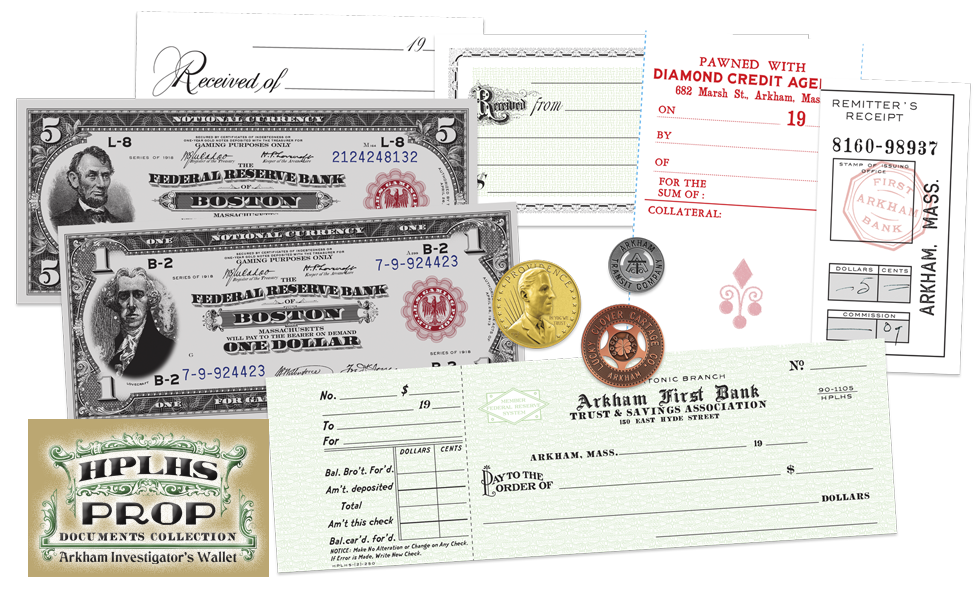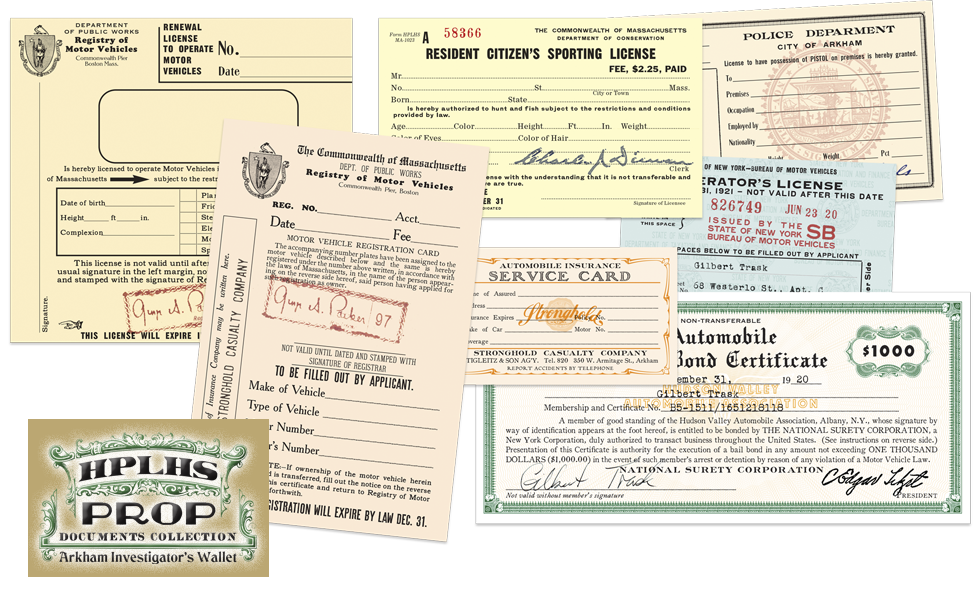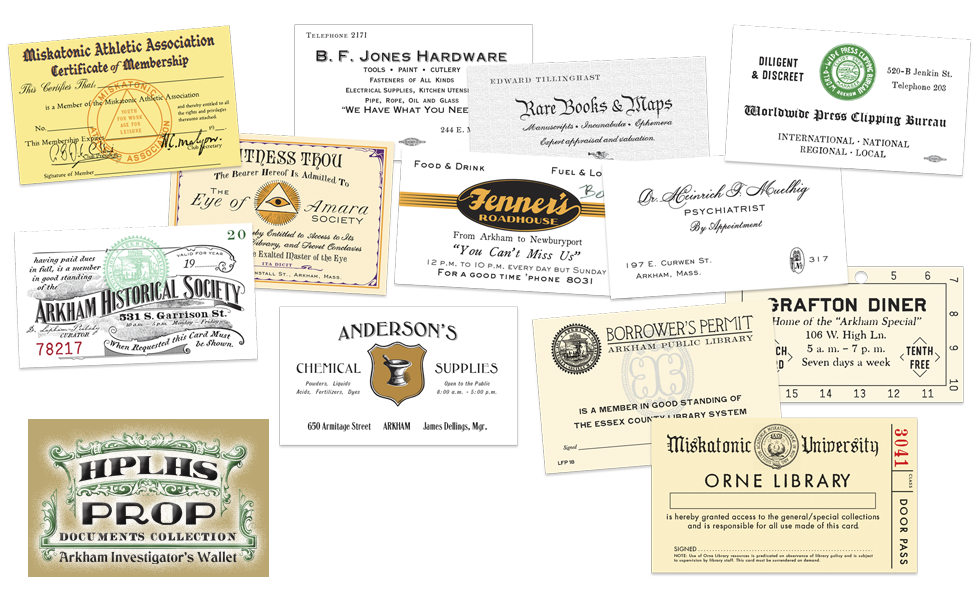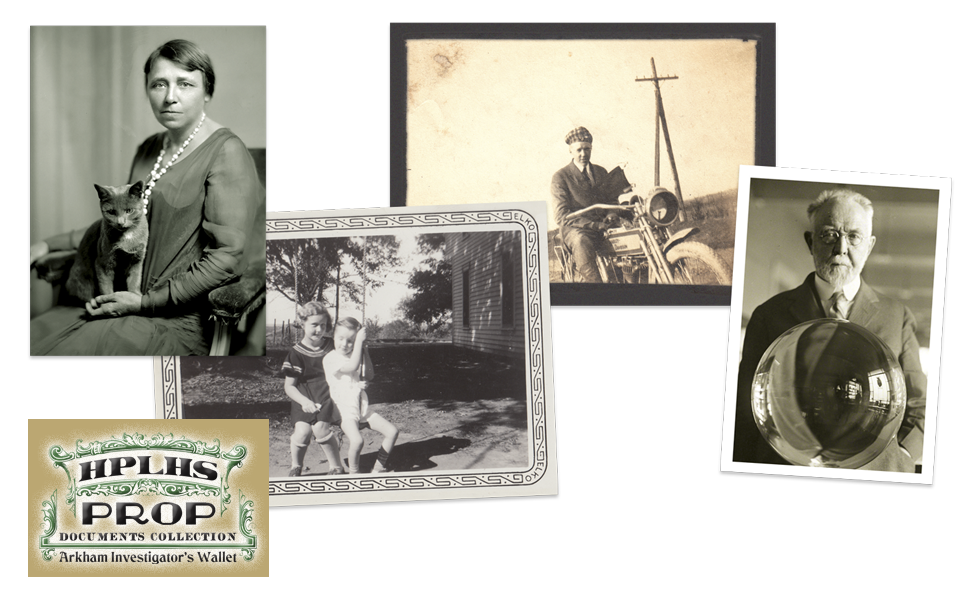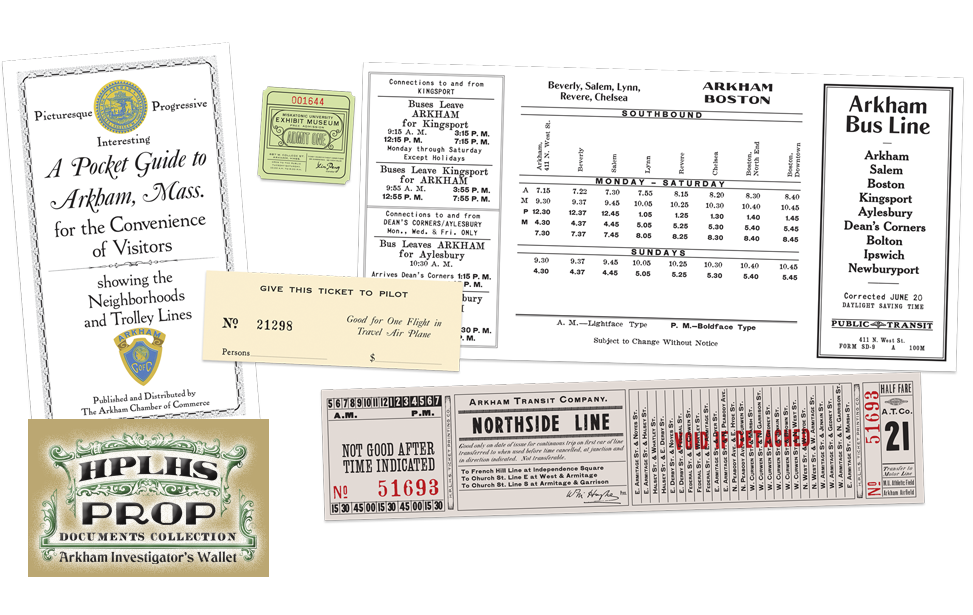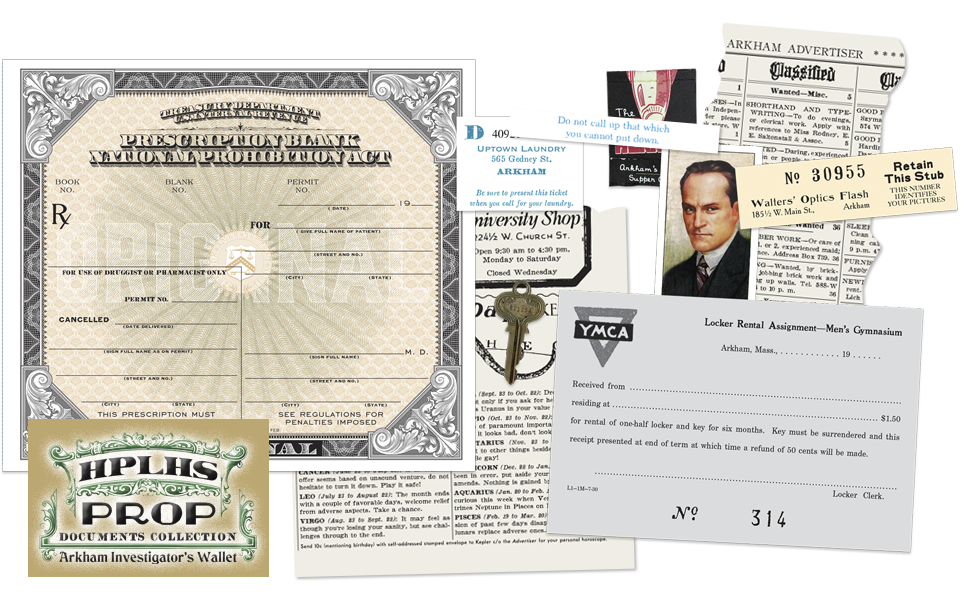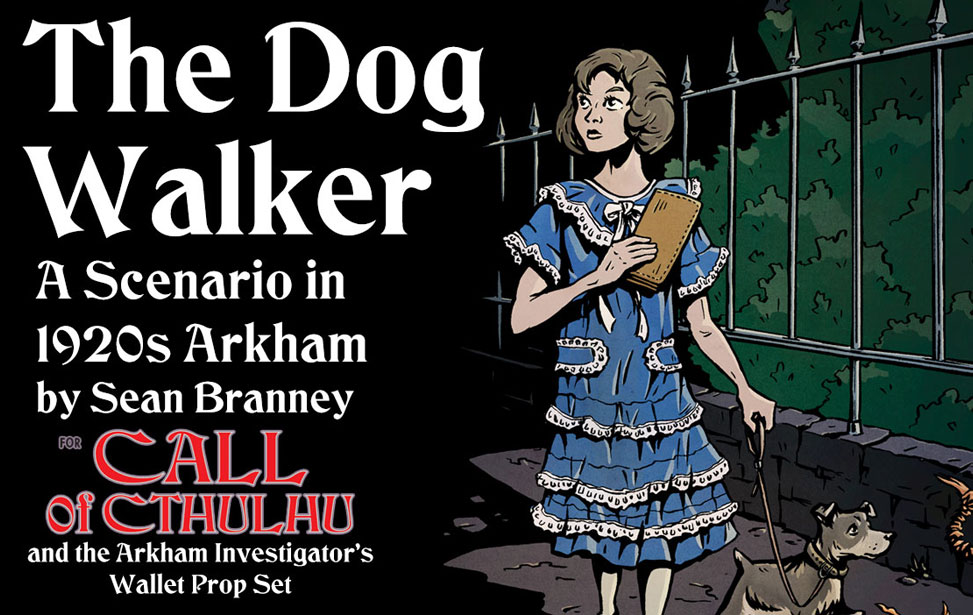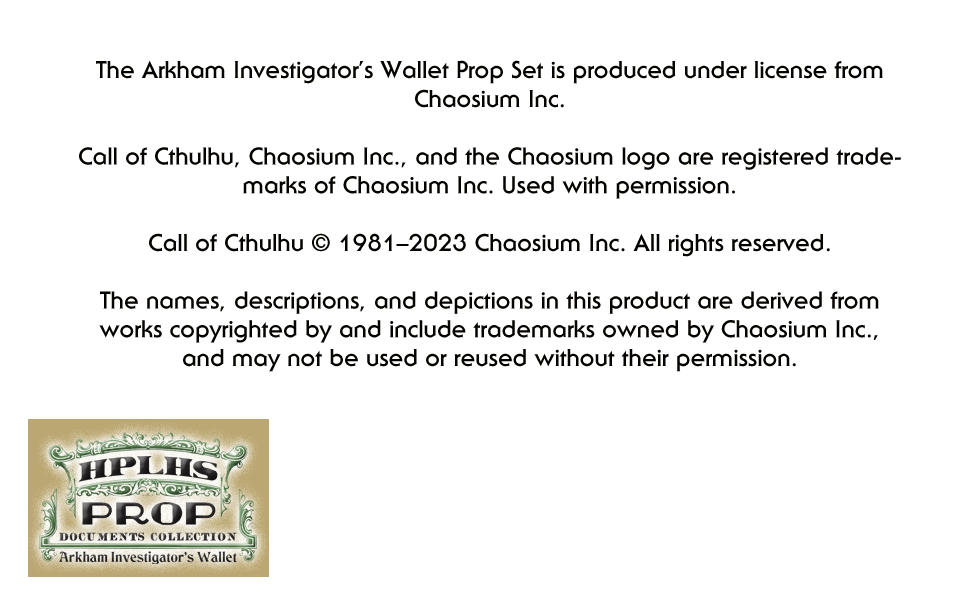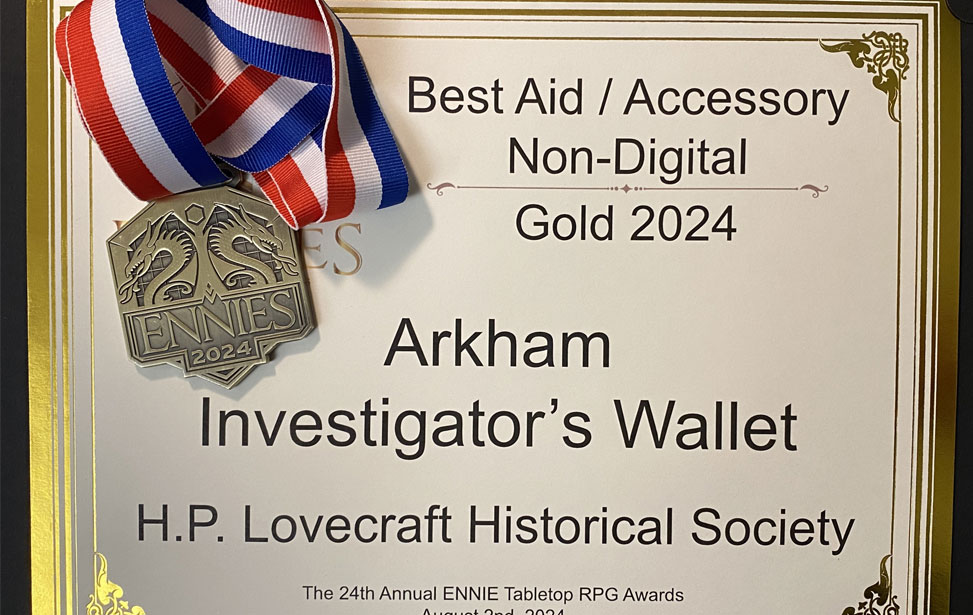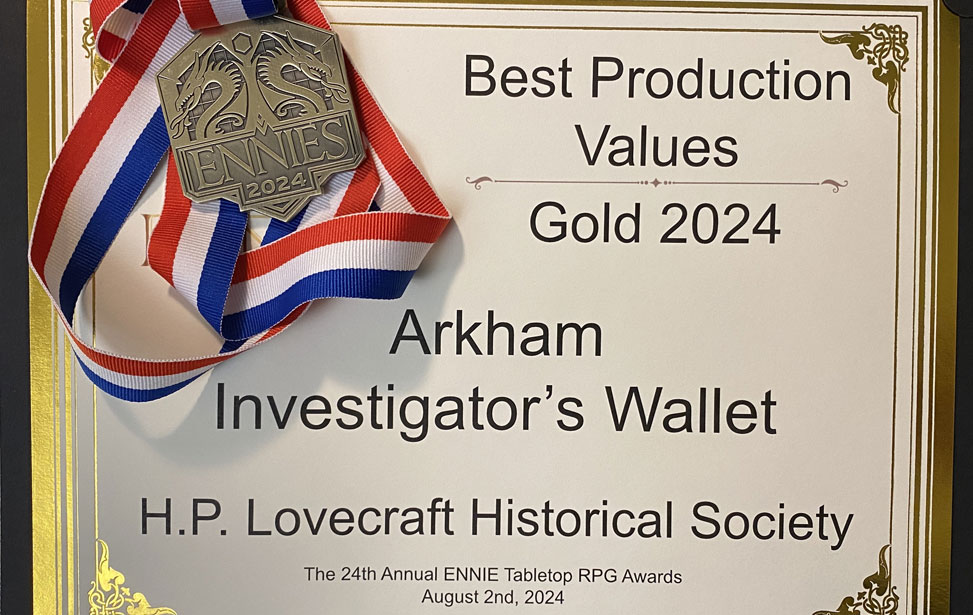Arkham Investigator's Wallet Prop Set
"Wallet litter." That's the term for all the forgotten cards and scraps of paper that accumulate in a person's wallet over time, and they can tell a story all their own. Lovecraft was a big proponent of realistic mundane details in horror fiction, because they make the fantastic element of the story more believable. Whether you’re a Keeper or an Investigator, the Arkham Investigator’s Wallet will take you deeper into any Call of Cthulhu® game set in Arkham. Maybe it’s in your character’s pocket, or maybe you’re using it to identify a dead body. This genuine leather wallet is loaded with more than 40 detailed and realistic prop documents, vintage “money”, metal coins and a real vintage key to spark your imagination. This page is meant to provide you with extra detail to help you get the most use out of your wallet and the many items it contains.
We're proud to say the wallet won two Golden Ennie awards at GenCon in 2024: Best Aid—Non-Digital and Best Production Values!
The Props
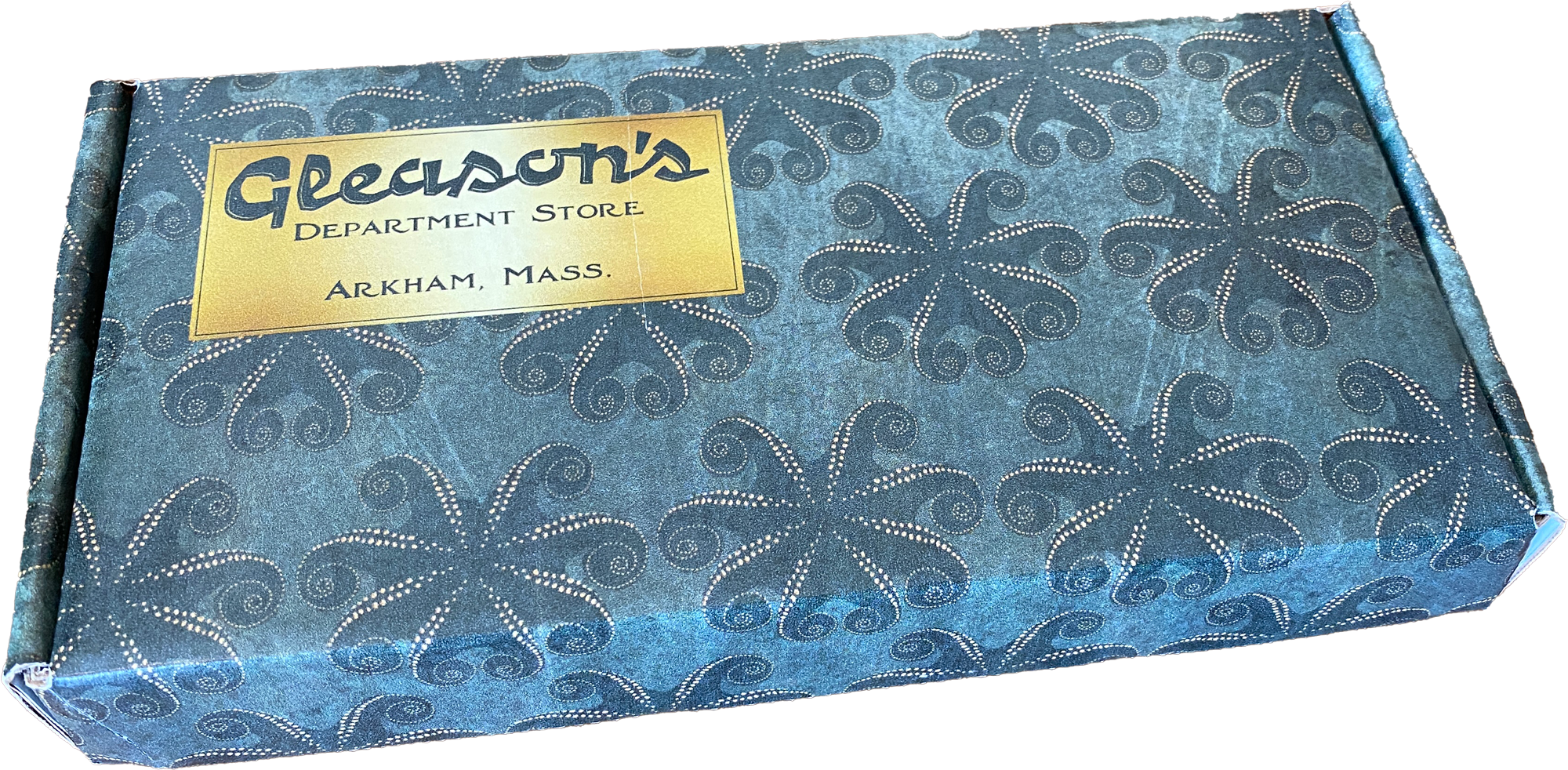 You know how sometimes when kids get a present they end up playing with the box it came in? Well with the box for this wallet that's perfectly appropriate, because it is also a prop! Designed to be a gift box from Gleason's Department Store in Arkham, you can use it to temporarily store the props you don't need for "The Dog Walker", other clues or whatever you like.
You know how sometimes when kids get a present they end up playing with the box it came in? Well with the box for this wallet that's perfectly appropriate, because it is also a prop! Designed to be a gift box from Gleason's Department Store in Arkham, you can use it to temporarily store the props you don't need for "The Dog Walker", other clues or whatever you like.
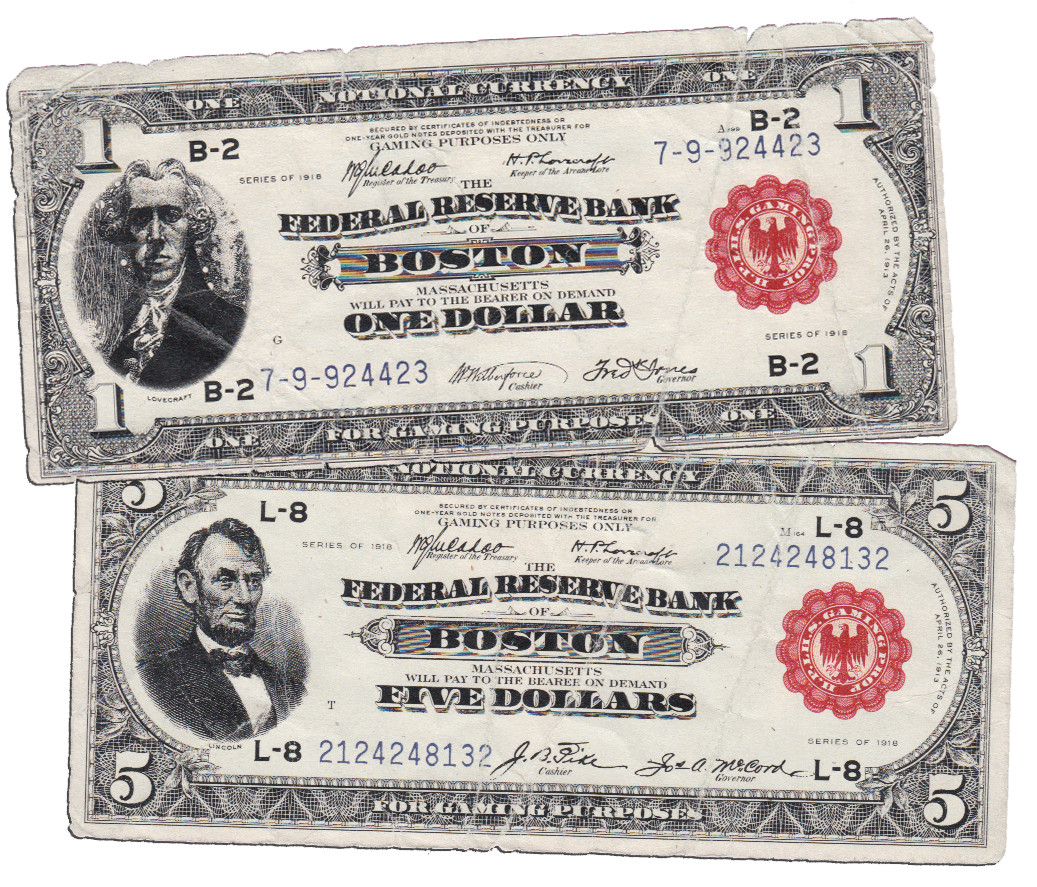 The history of paper money in the US is long and complicated, and in the time of Lovecraft there were several different kinds of it still in circulation, from gold and silver certificates to United States Notes and others. The currency contained in the wallet is based on Federal Reserve Notes from 1918. In order to make them fit inside the wallet we've made them a little smaller than the real thing, and of course we've changed lots of other details in order to follow US government rules about fake money. We have also elaborately aged them so that they feel like they've been in circulation for a while, and the ones you get will doubtless have random cracks and creases and crumples to make them look and feel more realistic. Please do us all a favor and do not try to pass off your prop money as the real thing.
The history of paper money in the US is long and complicated, and in the time of Lovecraft there were several different kinds of it still in circulation, from gold and silver certificates to United States Notes and others. The currency contained in the wallet is based on Federal Reserve Notes from 1918. In order to make them fit inside the wallet we've made them a little smaller than the real thing, and of course we've changed lots of other details in order to follow US government rules about fake money. We have also elaborately aged them so that they feel like they've been in circulation for a while, and the ones you get will doubtless have random cracks and creases and crumples to make them look and feel more realistic. Please do us all a favor and do not try to pass off your prop money as the real thing.
When using the money in-game, be aware that one dollar in the 1920s/'30s has the buying power of about $20 today, and the five-dollar note in the wallet is roughly the equivalent of a hundred bucks.
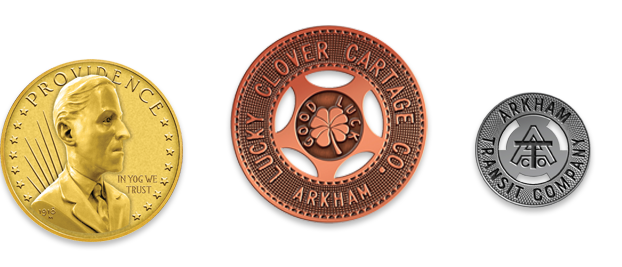 Gold coins were still in circulation in the time of Lovecraft, at least up until 1933, when the Great Depression inspired most governments to abandon the gold standard. The US had four gold coins circulating until 1929: the quarter-eagle ($2.50), half-eagle ($5), eagle ($10) and double-eagle ($20). For this wallet we decided to produce our own version of the double-eagle, replacing the motto "Liberty" with "Providence", and using a bust of Lovecraft inspired by the sculpture of our old pal Bryan Moore. The reverse is inspired by an art deco Masonic two-headed eagle. In 1920s Arkham this coin has the buying power of about $400 today. In the real world, it makes for a nice challenge coin.
Gold coins were still in circulation in the time of Lovecraft, at least up until 1933, when the Great Depression inspired most governments to abandon the gold standard. The US had four gold coins circulating until 1929: the quarter-eagle ($2.50), half-eagle ($5), eagle ($10) and double-eagle ($20). For this wallet we decided to produce our own version of the double-eagle, replacing the motto "Liberty" with "Providence", and using a bust of Lovecraft inspired by the sculpture of our old pal Bryan Moore. The reverse is inspired by an art deco Masonic two-headed eagle. In 1920s Arkham this coin has the buying power of about $400 today. In the real world, it makes for a nice challenge coin.
The token of the Lucky Clover Cartage Company was inspired by aluminum souvenir tokens that you could get from metal stamping machines at fairs and amusement parks in decades gone by. This is potentially a very valuable item to an Arkham investigator. Possession of this token marks you as a favored customer of the Lucky Clover Cartage Company, and it might save you from getting beaten up by Danny O'Bannion's goons. It might get you an audience with O'Bannion himself, who is in a position to grant significant favors. It's possible it serves to get you admission to Arkham's speakeasy, which is guarded by O'Bannion's men. And of course you can use it as a binary decision-making device or skill tester, with the lucky clover on one side and the devil on the other. At the Keeper's discretion maybe it temporarily increases your chances of succeeding at any skill roll you make.
The Arkham Transit token will enable you to hop on any Arkham trolley car and transfer to any other, so it's a convenient way to get anywhere in town. Public transit fare tokens were in use from 1831 and common in the time of Lovecraft. Since trolley and bus fares were often odd amounts or fractional cents, it was easier for passengers to use tokens instead of getting change or using multiple coins. (In Arkham, for example, trolley fare is six cents if you want a transfer, so the token is more convenient than using a nickel and a penny (or six pennies)). Some transit companies made tokens more attractive by selling them in rolls at a discount off the standard fare, so it was actually cheaper to use tokens than pocket change. Transit tokens often had cut-outs so people wouldn't mistake them for regular coins. Once-ubiquitous transit tokens began to get phased out after fare cards were introduced in the early 2000s, and are now highly collectible.
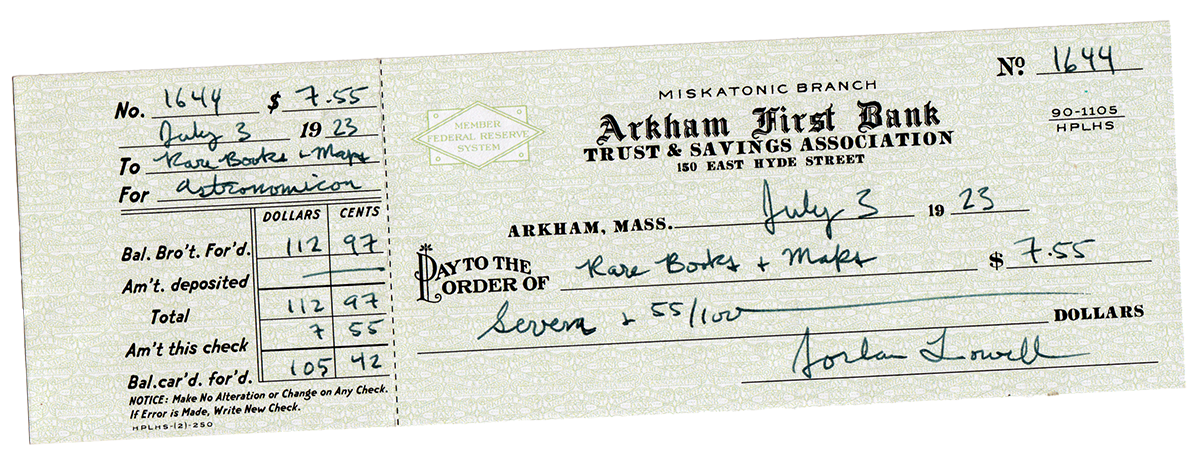 Checks have been used as a way to pay people since at least the 9th century, and they were at the peak of popularity in the early 20th century. Magnetic ink, machine-readable characters and other safeguards were not introduced until the 1950s, and in the time of Lovecraft checks did not contain any pre-printed personal or bank account information on them. They were not usually even pre-numbered. To write a check in the 1920s you would number it yourself, and your signature was all that was required for your bank to identify you and honor it. Balancing your checkbook required you to write all the details of the transaction in your own check register. Shown here is a sample of the kind of information you would want to write on the check. To use as a clue in a game, you might want to separate the check from the check stub and leave only the stub in the wallet.
Checks have been used as a way to pay people since at least the 9th century, and they were at the peak of popularity in the early 20th century. Magnetic ink, machine-readable characters and other safeguards were not introduced until the 1950s, and in the time of Lovecraft checks did not contain any pre-printed personal or bank account information on them. They were not usually even pre-numbered. To write a check in the 1920s you would number it yourself, and your signature was all that was required for your bank to identify you and honor it. Balancing your checkbook required you to write all the details of the transaction in your own check register. Shown here is a sample of the kind of information you would want to write on the check. To use as a clue in a game, you might want to separate the check from the check stub and leave only the stub in the wallet.
The URL shown on the Read-Me card that came with your wallet has a link to download printable extra checks. There is an alternate version of this check in the original HPLHS Prop Documents Collection as well (along with other Arkham banking documents that might be useful).
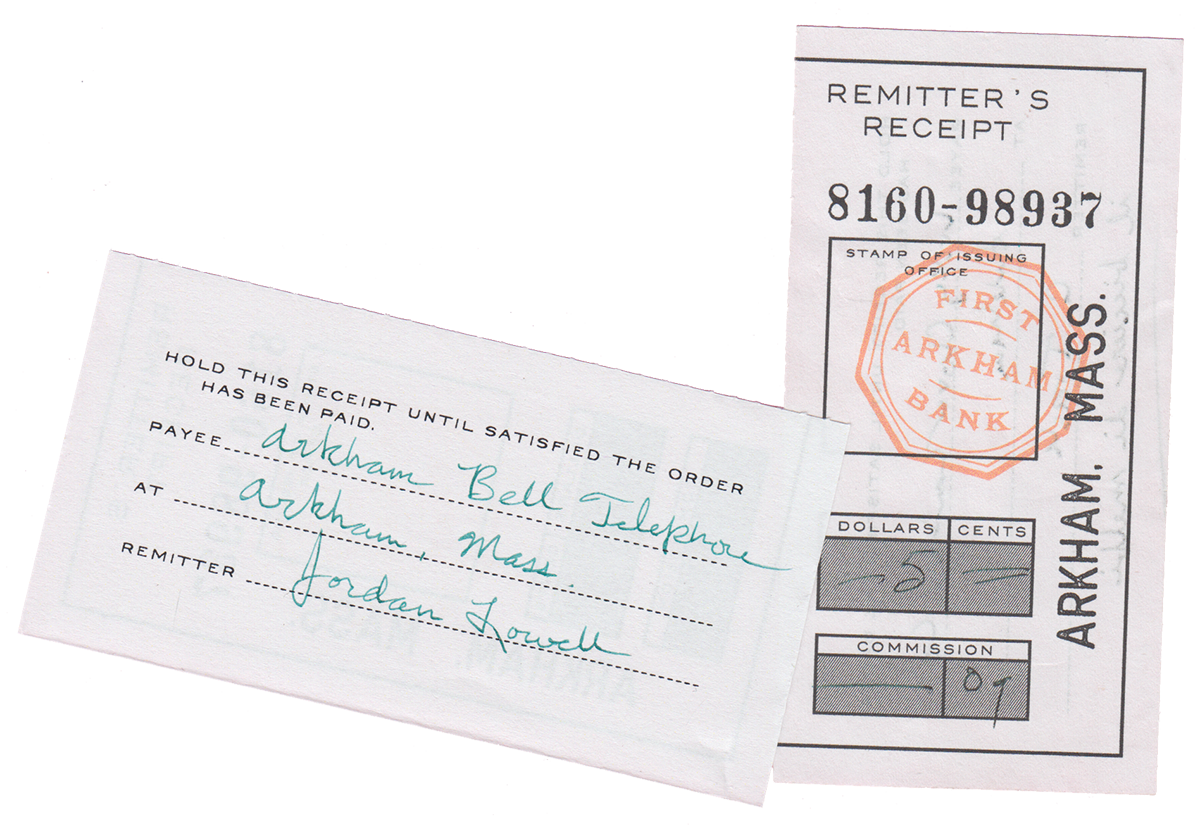 This prop is based on an actual receipt we found in a real vintage wallet we bought on eBay while doing research for this project. This is the kind of receipt that you would get if you sent a money order, and it can be a valuable clue as a record of a transaction. Money orders can be issued by any number of private institutions like banks, and the U.S. Post Office has issued money orders since the 1860s as a way to allow people to avoid sending cash through the mail, with the hope of reducing the number of postal robberies. American Express got into the money order business in 1882. If you didn't have a personal checking account, which a lot of people didn't have in the 1920s, money orders were a safe way of paying your bills. You would hold on to this receipt until you were certain the payment had been received because the company issuing the money order would refund it if it got lost or stolen, provided you could show them this receipt.
This prop is based on an actual receipt we found in a real vintage wallet we bought on eBay while doing research for this project. This is the kind of receipt that you would get if you sent a money order, and it can be a valuable clue as a record of a transaction. Money orders can be issued by any number of private institutions like banks, and the U.S. Post Office has issued money orders since the 1860s as a way to allow people to avoid sending cash through the mail, with the hope of reducing the number of postal robberies. American Express got into the money order business in 1882. If you didn't have a personal checking account, which a lot of people didn't have in the 1920s, money orders were a safe way of paying your bills. You would hold on to this receipt until you were certain the payment had been received because the company issuing the money order would refund it if it got lost or stolen, provided you could show them this receipt.
For this prop we have pre-entered a relatively high dollar amount and stamped it as being issued from Arkham First Bank, but we have left the space on the back blank for you to add your own payee information to turn this into a clue. For use in "The Dog Walker", specific payee information should be entered, detailed in the game book. The URL shown on the Read-Me card that came with your wallet has a link to download additional printable blank remitter receipts.
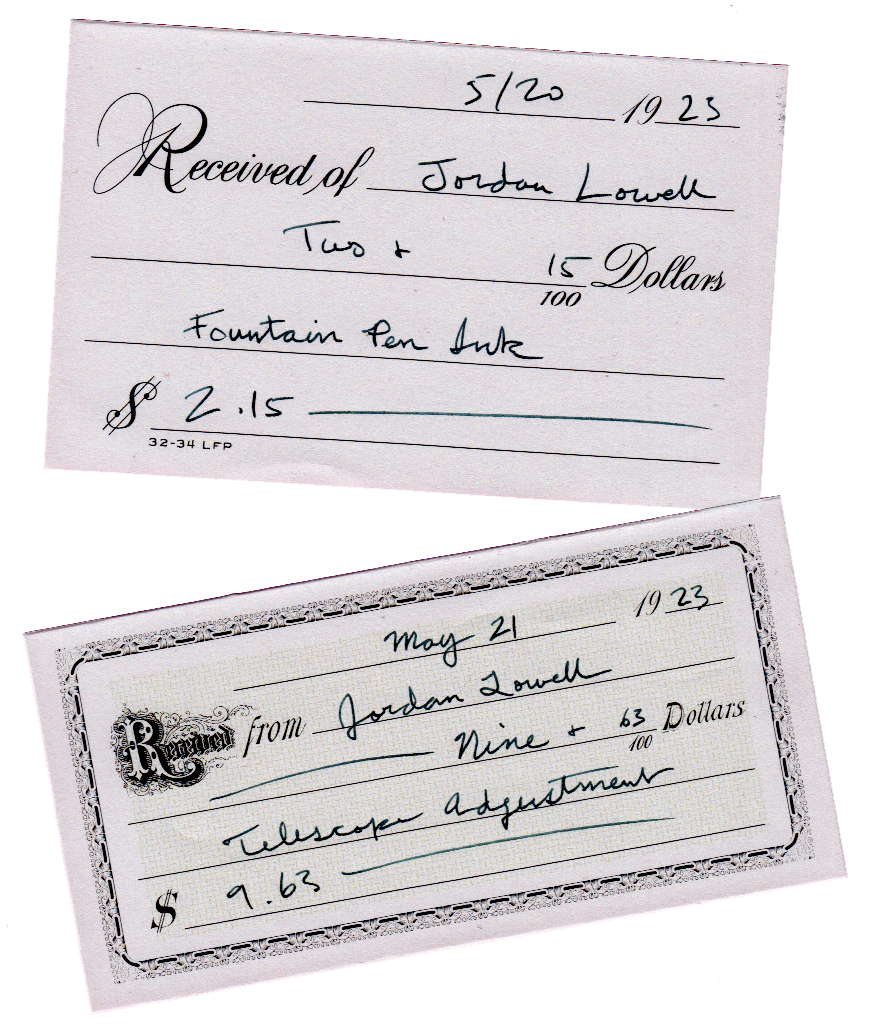 Transaction records make great clues for solving a mystery. Although cash registers have been capable of printing receipts for a very long time, back in the 1920s they were often written out by hand, especially at smaller businesses. A merchant would buy a book of blank receipts from a stationer or office supply company, or could pay to have some custom printed with his/her business name and address on them. In order to make these props as generally useful as possible, we have left them blank for you to write business info and transaction details. A business name and address could be rubberstamped on the back.
Transaction records make great clues for solving a mystery. Although cash registers have been capable of printing receipts for a very long time, back in the 1920s they were often written out by hand, especially at smaller businesses. A merchant would buy a book of blank receipts from a stationer or office supply company, or could pay to have some custom printed with his/her business name and address on them. In order to make these props as generally useful as possible, we have left them blank for you to write business info and transaction details. A business name and address could be rubberstamped on the back.
Visit the URL shown on the Read-Me card that came with your wallet to download additional printable blank receipts. There are also PDFs with customizable form fields which you can use to print receipts from specific businesses.
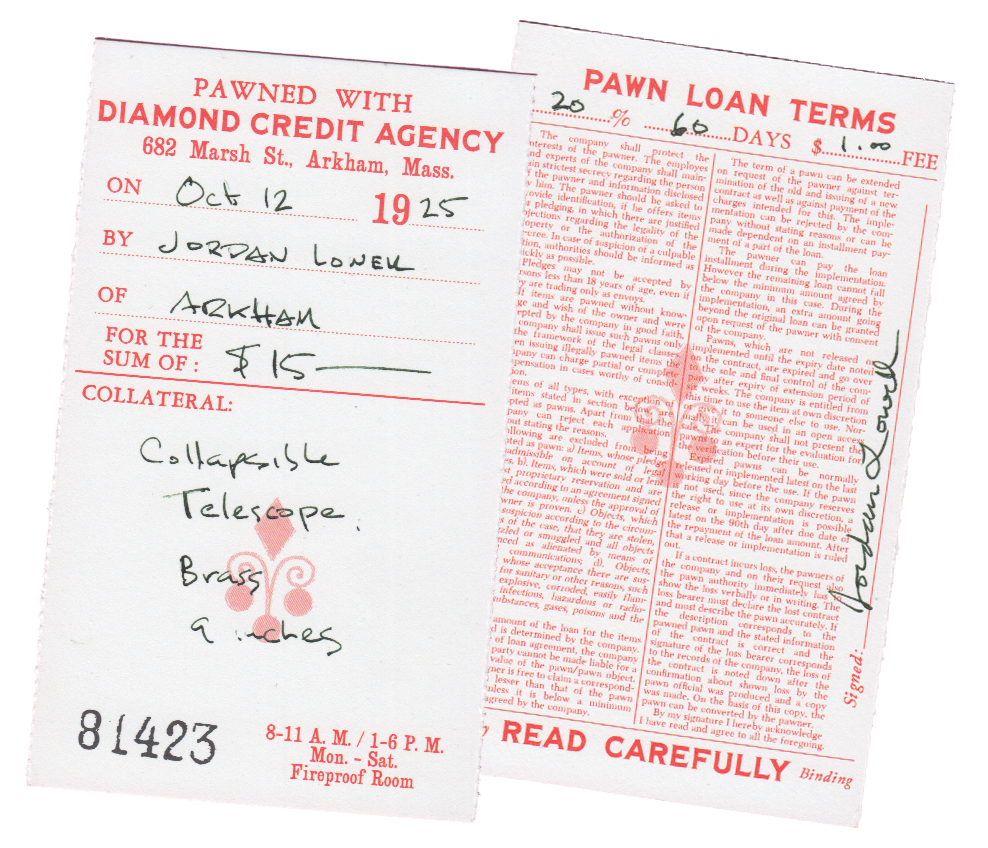 There have been pawnbrokers for about 3000 years, starting in ancient China, Greece and Rome. Pawn loans are a way of getting short-term access to cash by putting up some personal property as collateral. Jewelry, musical instruments, and weapons of various kinds have long been used as pawn collateral, although local laws regulate what can and cannot be pawned. As long as you pay back the loan plus any interest and/or fees in the time specified in the loan contract, you get your personal property back. If you don't pay back on time, the pawnbroker is free to sell your stuff to anybody who wants it. Because pawn loans are secured by collateral, they have no effect on your credit rating.
There have been pawnbrokers for about 3000 years, starting in ancient China, Greece and Rome. Pawn loans are a way of getting short-term access to cash by putting up some personal property as collateral. Jewelry, musical instruments, and weapons of various kinds have long been used as pawn collateral, although local laws regulate what can and cannot be pawned. As long as you pay back the loan plus any interest and/or fees in the time specified in the loan contract, you get your personal property back. If you don't pay back on time, the pawnbroker is free to sell your stuff to anybody who wants it. Because pawn loans are secured by collateral, they have no effect on your credit rating.
The Diamond Credit Agency is Arkham's main pawnbroker, and they have seen a lot of weird stuff over the years. This prop has been left blank for you to use as you see fit, and the kind of info you should enter is shown in this sample. For "The Dog Walker" this prop should get customized by hand with specific information detailed in the game book.
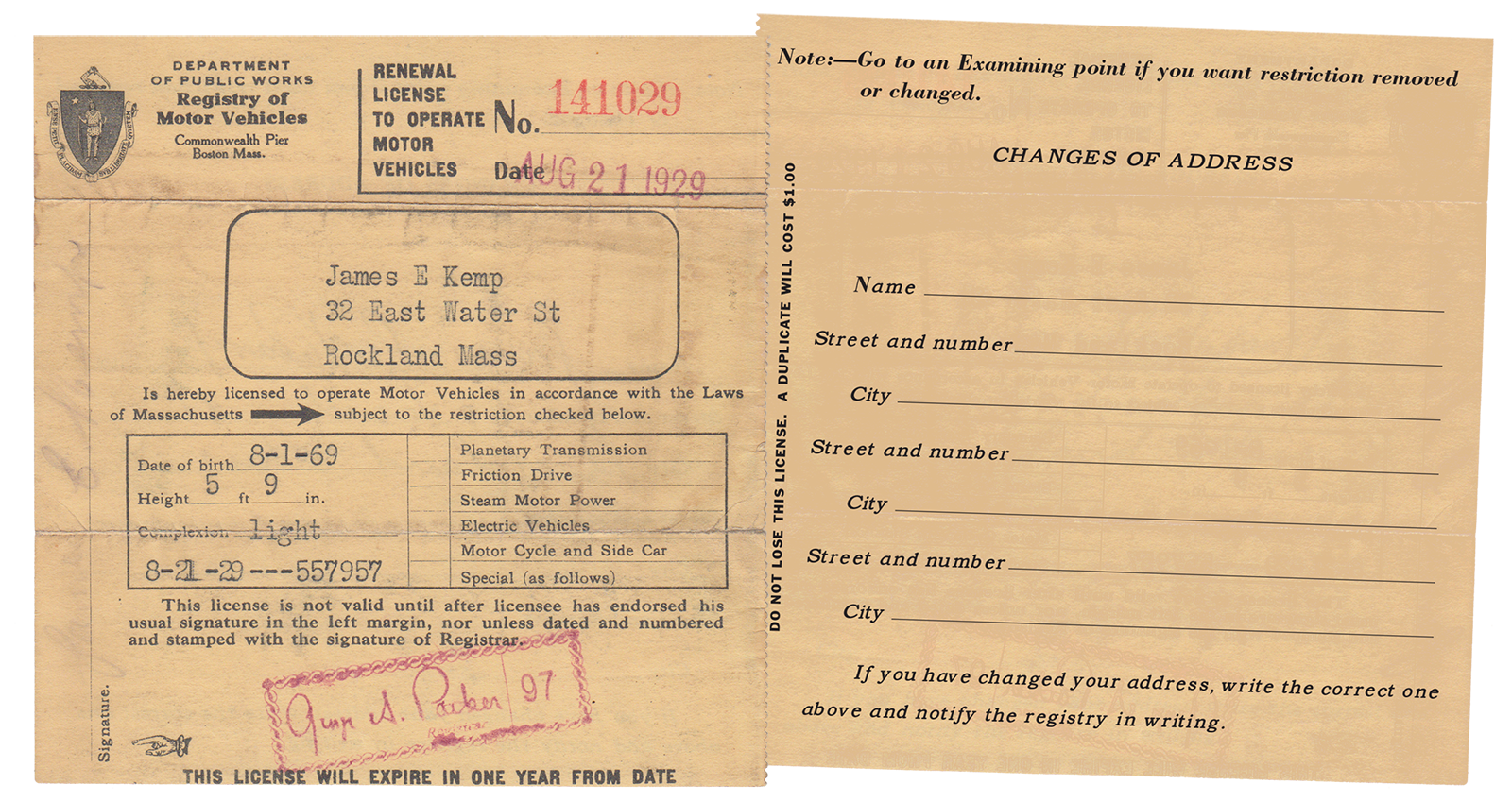 Requiring motor vehicle operators to get a license had only been a thing in the US since about 1910, so license requirements varied from state to state and the size and shape of licenses was not yet standardized. People were already using them as a form of identification.
Requiring motor vehicle operators to get a license had only been a thing in the US since about 1910, so license requirements varied from state to state and the size and shape of licenses was not yet standardized. People were already using them as a form of identification.
Shown here is a real 1920s Massachusetts license so you can see how the prop should be filled out. It would be perfectly fine to fill the whole thing out by hand with a pen, but if you have access to a typewriter you could use that. At the URL on the read-me card that came with your wallet you can download a PDF with customizable form fields that will let you use a virtual typewriter and rubber stamp if you wish, or print a blank replacement.
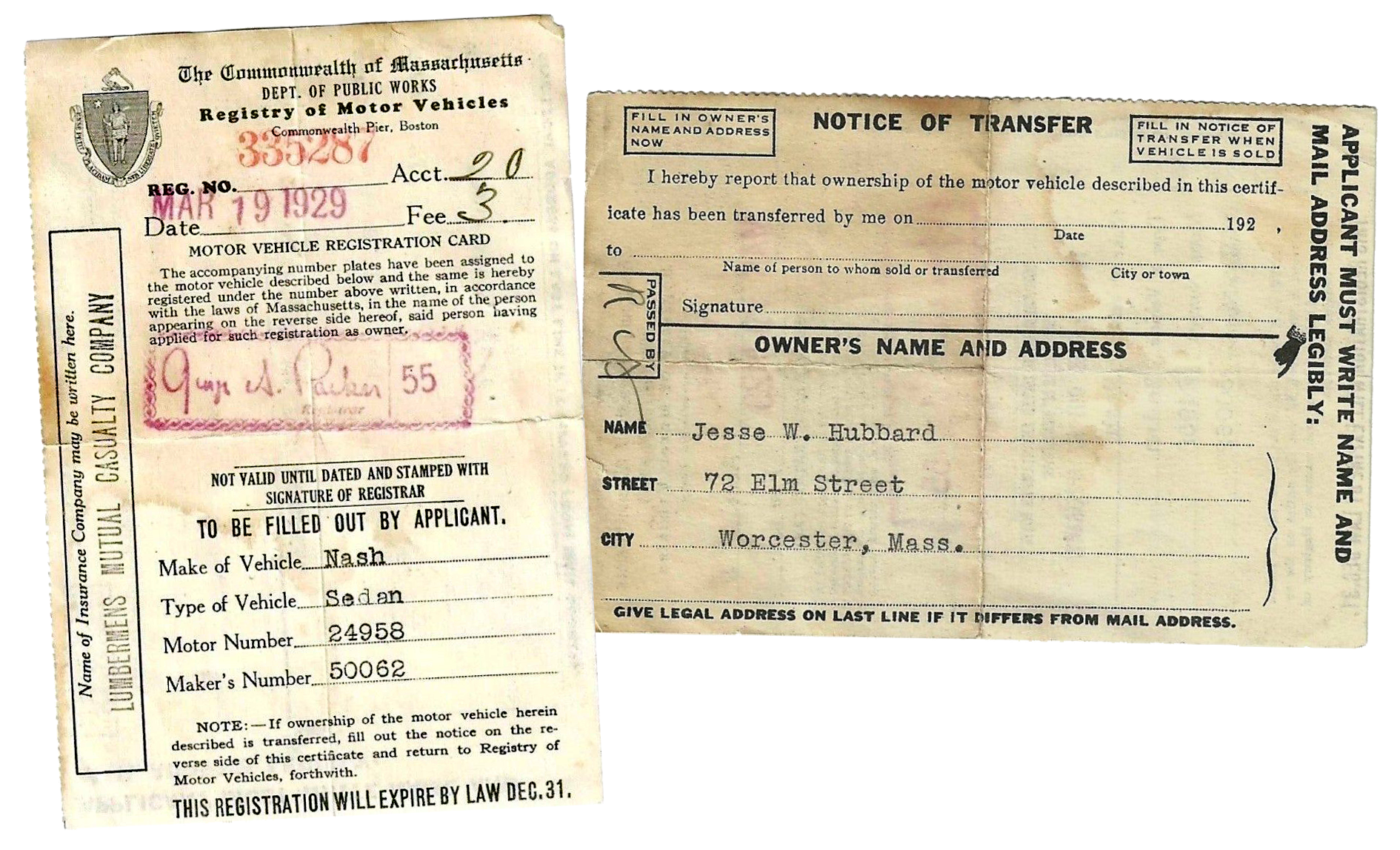 Massachusetts was the first US state to issue license plates, starting in 1903. Throughout the 1920s and '30s, MA license plates had six-digit numbers with no letters.
Massachusetts was the first US state to issue license plates, starting in 1903. Throughout the 1920s and '30s, MA license plates had six-digit numbers with no letters.
Shown here is a real 1920s Massachusetts auto registration to show you how the blank prop should be filled out. It would be just fine to do it all by hand, but you could also use a typewriter if you have access to one. Or you could go to the URL shown on the read-me card that came with your wallet to download a PDF with customizable form fields, or print a blank replacement.
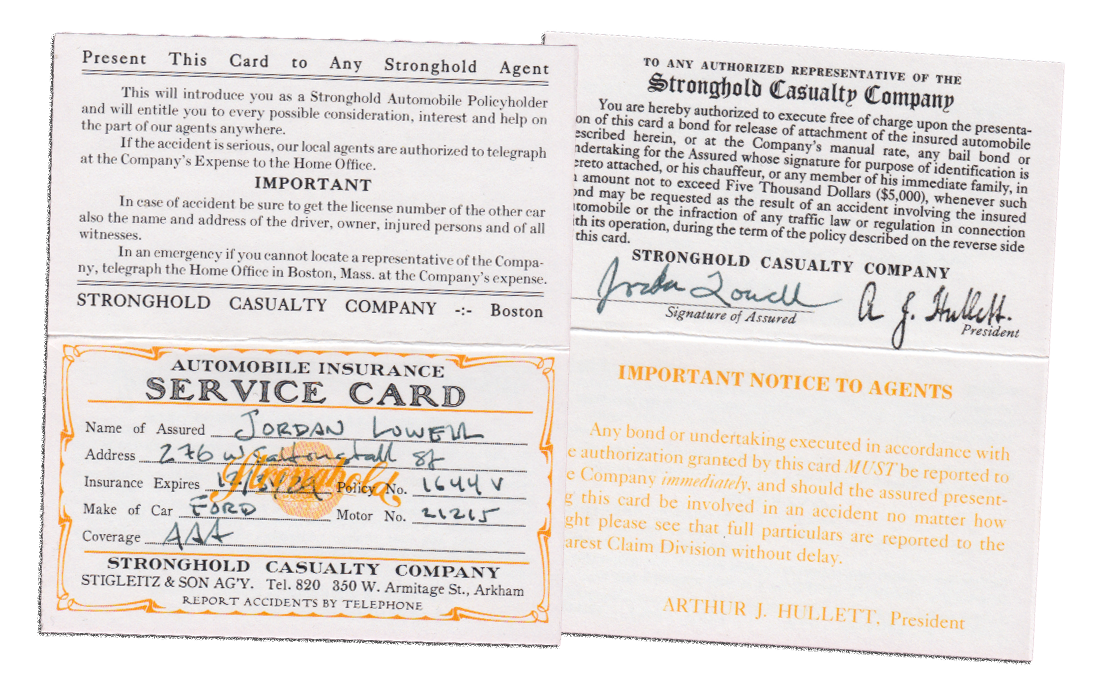 People recognized from the beginning that cars could be very dangerous, and automobile insurance came into existence shortly after automobiles themselves. By 1912 policies were fairly comprehensive, and in 1925 Massachusetts became the first state to make auto insurance mandatory.
People recognized from the beginning that cars could be very dangerous, and automobile insurance came into existence shortly after automobiles themselves. By 1912 policies were fairly comprehensive, and in 1925 Massachusetts became the first state to make auto insurance mandatory.
Having this card in your wallet can really help you out of a number of situations. This prop is a hybrid of a number of real insurance cards from the 1920s, and Stronghold Casualty is a made-up insurance company. It may come in handy if your character is involved in a high-speed chase or emergency departure from a cemetery or the like. You'll note in the fine print on the back of the card that Stronghold Casualty will cover the cost of a bail bond up to $5000 for the person named on the front of the card in case they are ever thrown in jail as the result of a traffic accident or moving violation. Under certain circumstances, it is essentially a get-out-of-jail-free card.
There are other Stronghold insurance products in the original HPLHS Prop Documents Collection. Investigating the Mythos can be a risky business. Maybe your character should have life insurance?
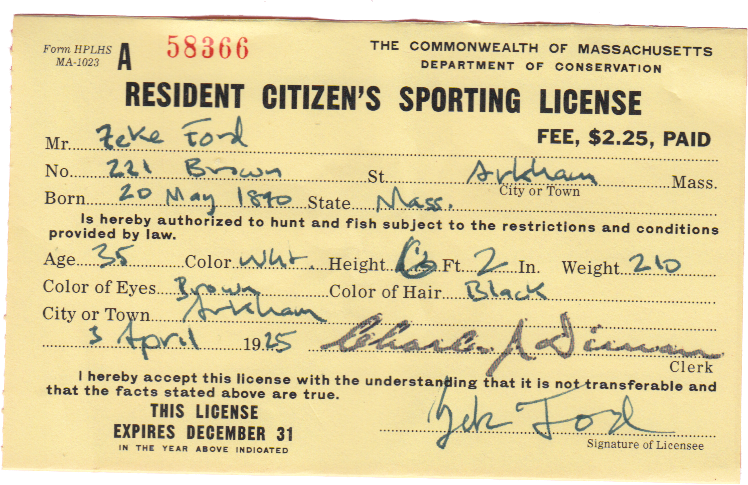 You don't technically need a license to hunt Byakhee or Mi-go or go fishing for Deep Ones, but if you're out in the woods shooting at things this piece of paper might help you explain yourself when the cops show up. Hunting and fishing have always been heavily regulated for a number of excellent reasons, and hunting licenses have been around for over a thousand years. This prop is a replica of a real vintage Massachusetts sporting license that covers both hunting and fishing.
You don't technically need a license to hunt Byakhee or Mi-go or go fishing for Deep Ones, but if you're out in the woods shooting at things this piece of paper might help you explain yourself when the cops show up. Hunting and fishing have always been heavily regulated for a number of excellent reasons, and hunting licenses have been around for over a thousand years. This prop is a replica of a real vintage Massachusetts sporting license that covers both hunting and fishing.
The prop should be filled out by hand. If you want a typewriter/rubber stamp look, a customizable form-field version is available in the original HPLHS Prop Documents Collection.
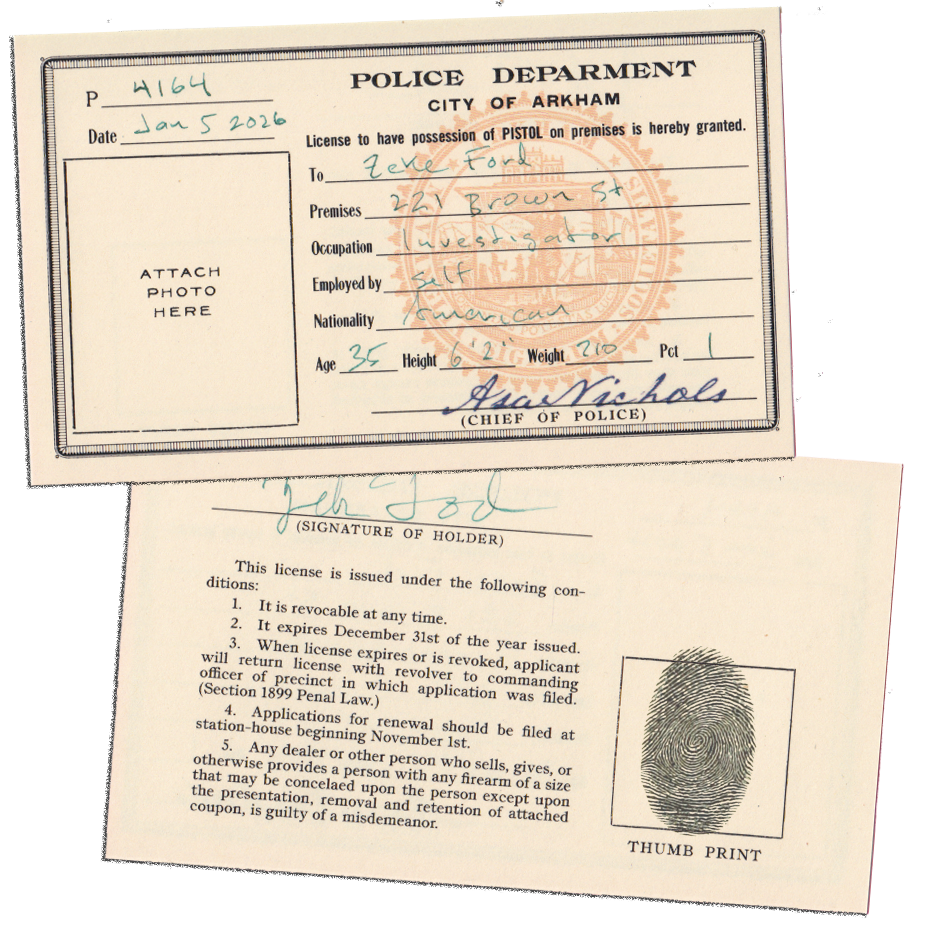 Guns are not often really helpful in battling the forces of the Mythos, but a lot of investigators carry them all the same. Massachusetts has long had some of the most restrictive gun laws in the US, and gun permits were, and still are, issued by local police departments. This permit is intended to allow only an ordinary handgun, but Chief Nichols has the power to grant exceptions (just cross out the word "Pistol" and write in something else). Then again, if you're carrying around a Tommy gun you're probably not really worried about having all the correct paperwork anyway.
Guns are not often really helpful in battling the forces of the Mythos, but a lot of investigators carry them all the same. Massachusetts has long had some of the most restrictive gun laws in the US, and gun permits were, and still are, issued by local police departments. This permit is intended to allow only an ordinary handgun, but Chief Nichols has the power to grant exceptions (just cross out the word "Pistol" and write in something else). Then again, if you're carrying around a Tommy gun you're probably not really worried about having all the correct paperwork anyway.
This prop is modeled on a New York gun permit from the 1920s. It should be filled out by hand. You'll need to provide your own photo and thumb print. You can find a downloadable PDF to print replacement permits at the URL shown on the read-me card that came with your wallet.
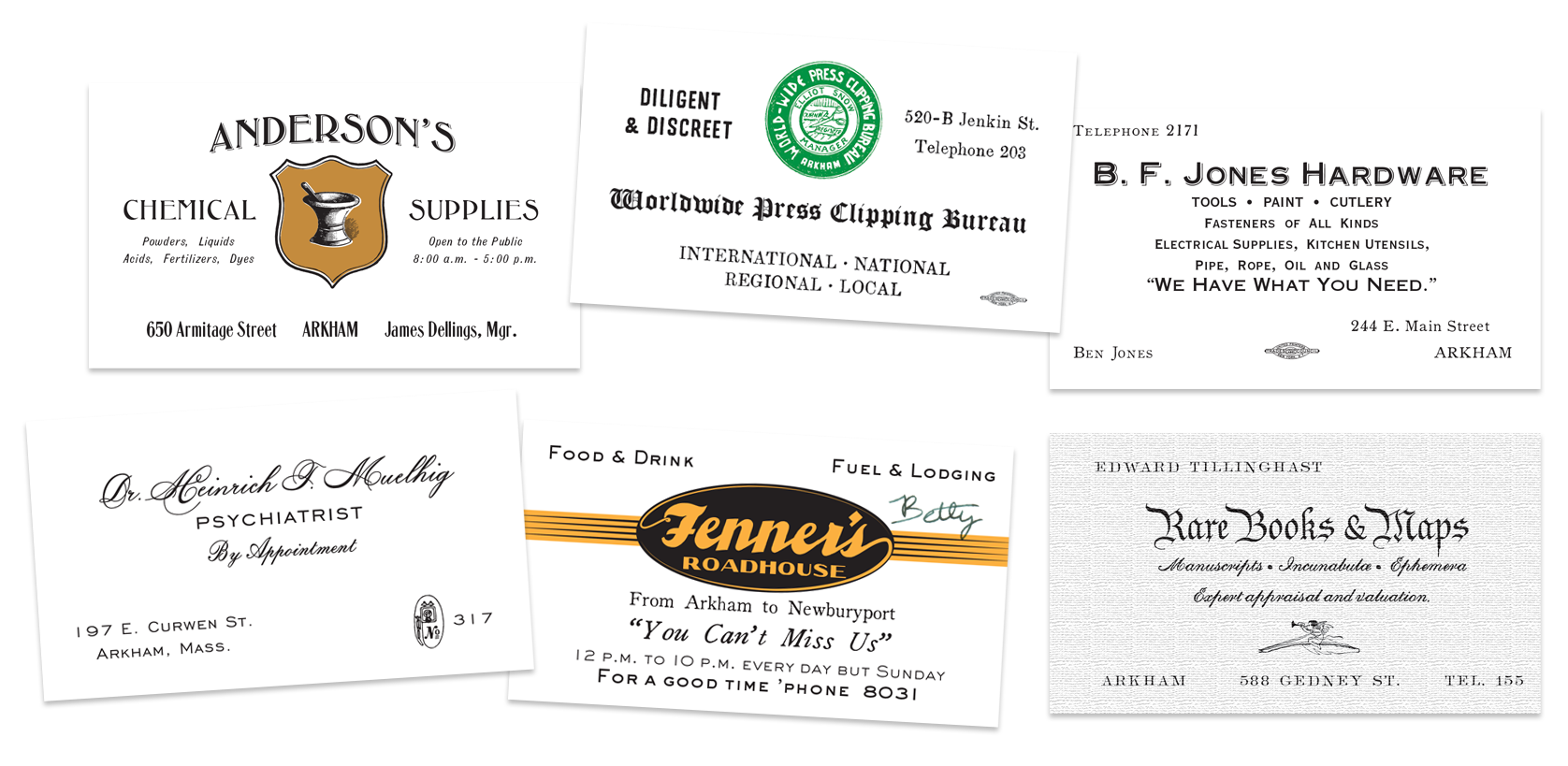 Business cards have been around for a very long time, and the 3.5 x 2 inch size has been standard in the US since the 1920s. Arkham has lots of fun and interesting businesses, but we couldn't fit in cards for all of them so we had to select a few representatives, and present a variety of stocks and printing flourishes.
Business cards have been around for a very long time, and the 3.5 x 2 inch size has been standard in the US since the 1920s. Arkham has lots of fun and interesting businesses, but we couldn't fit in cards for all of them so we had to select a few representatives, and present a variety of stocks and printing flourishes.
In case you don't recognize it, the little doodad in the bottom right corner of Dr. Muehlig's business card is a fancy European symbol for a telephone. That card has space on the back to record an appointment, and if you're playing "The Dog Walker" it gets customized with specific information detailed in the game book. A couple of the cards have the logo of the printer's union on them. Who is the "Betty" whose name is written on the Fenner's Roadhouse card? We wouldn't tell even if we knew. Maybe she's a waitress. Maybe someone just passing through town. Maybe she's the key to an entire mystery....
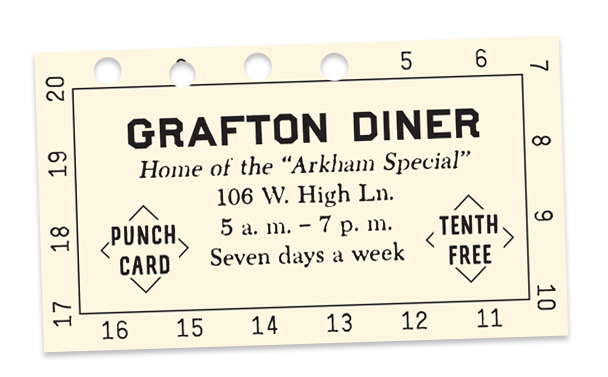 This business card is laid out as a punch card to get you a free meal or two at the Grafton Diner near the train station. We've pre-punched a number of holes for you.
This business card is laid out as a punch card to get you a free meal or two at the Grafton Diner near the train station. We've pre-punched a number of holes for you.
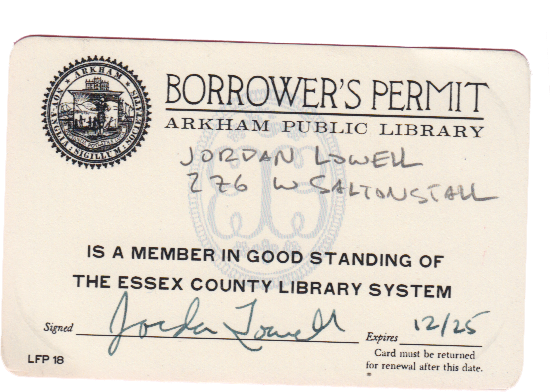 This card can get you the loan of books in the library's general collection, and on-site access to the reference stacks. It will also give you access to interlibrary loans from other institutions in the Essex County library system. Your name and address should be handwritten on the front, along with your signature and renewal date. The back is used to record the dates of check-outs and returns.
This card can get you the loan of books in the library's general collection, and on-site access to the reference stacks. It will also give you access to interlibrary loans from other institutions in the Essex County library system. Your name and address should be handwritten on the front, along with your signature and renewal date. The back is used to record the dates of check-outs and returns.
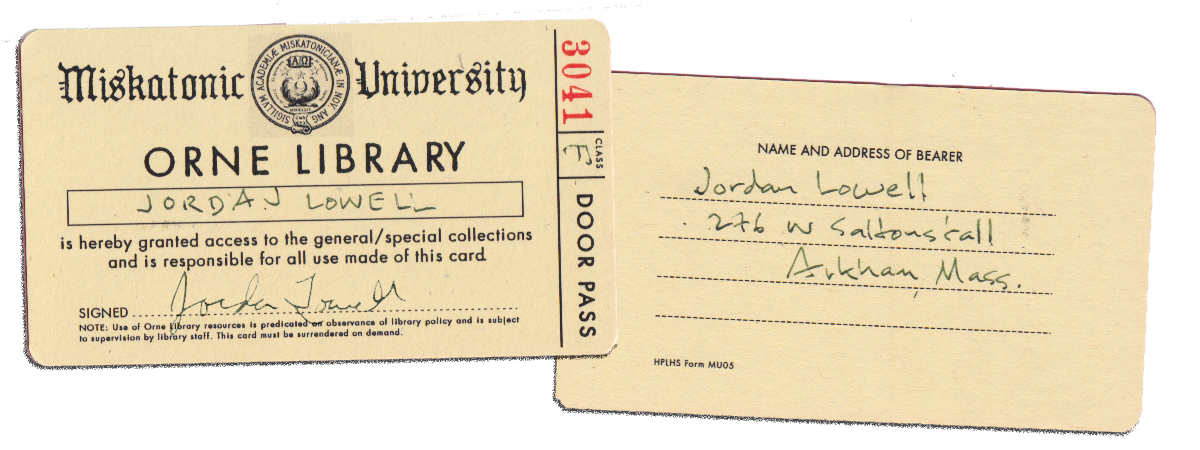 Any Miskatonic University student, and staff or faculty member, can use this card to get into the very impressive collection at M.U.'s Orne Library. Your name should be written on the front, and name and address on the back. It is perfectly fine to do it by hand, but can also be typewritten. There is a little square on the right edge labelled "Class". If a student, you can enter your graduating class number there. If on faculty or staff, enter "F" or "S". You can cross out the word "general" or "special", if desired, to indicate any restrictions that Dr. Armitage feels are necessary.
Any Miskatonic University student, and staff or faculty member, can use this card to get into the very impressive collection at M.U.'s Orne Library. Your name should be written on the front, and name and address on the back. It is perfectly fine to do it by hand, but can also be typewritten. There is a little square on the right edge labelled "Class". If a student, you can enter your graduating class number there. If on faculty or staff, enter "F" or "S". You can cross out the word "general" or "special", if desired, to indicate any restrictions that Dr. Armitage feels are necessary.
This item gets customized with specific information for "The Dog Walker" detailed in the game book. You can find a PDF of this item with customizable form fields at the URL shown on the read-me card that came with your wallet to print a replacement. We also offer free downloads of a Miskatonic Library Book Conversion Kit, which will help you turn any book into a book from Orne Library.
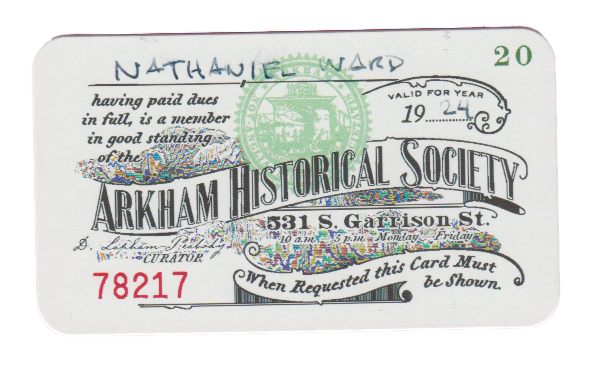 This card can get you access to the AHS headquarters, where there are numerous relics and records of the town's witch-haunted past. Your name and the year should be handwritten on the front.
This card can get you access to the AHS headquarters, where there are numerous relics and records of the town's witch-haunted past. Your name and the year should be handwritten on the front.
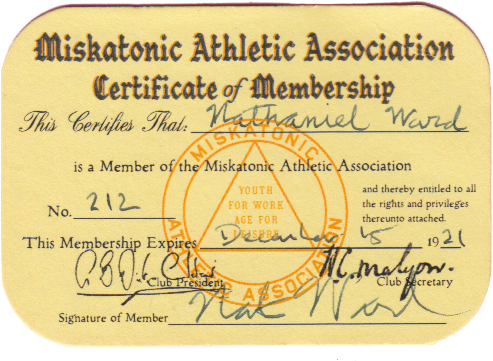 Arkham has a number of social clubs and societies, and the Miskatonic Athletic Association is one of the more exclusive. It is only open to men, although women are allowed in twice a year. This card gets you into the clubhouse, where you can socialize with Arkham's upper crust gentlemen and get booze. You should write your name, a member number and expiration date on the front, and sign it where indicated.
Arkham has a number of social clubs and societies, and the Miskatonic Athletic Association is one of the more exclusive. It is only open to men, although women are allowed in twice a year. This card gets you into the clubhouse, where you can socialize with Arkham's upper crust gentlemen and get booze. You should write your name, a member number and expiration date on the front, and sign it where indicated.
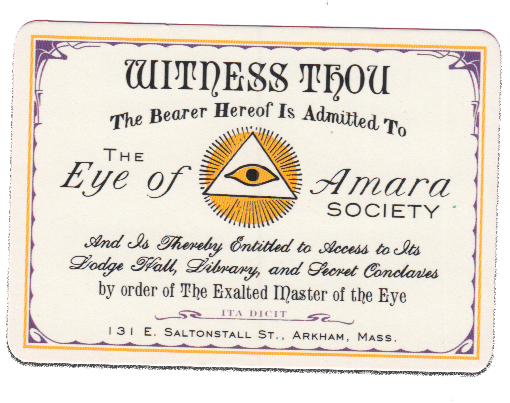 The 1920s and '30s was a golden age for fraternal and sororal societies, catering to all kinds of people with special interests, beliefs or common occupation or heritage. Belonging to the right societies and service clubs was often a key to social advancement. Some served to provide mutual aid to their members, and were basically specialized insurance companies. Some were deadly serious, with elaborate hierarchies and ceremonies, and others were little more than an excuse to throw an occasional pancake breakfast.
The 1920s and '30s was a golden age for fraternal and sororal societies, catering to all kinds of people with special interests, beliefs or common occupation or heritage. Belonging to the right societies and service clubs was often a key to social advancement. Some served to provide mutual aid to their members, and were basically specialized insurance companies. Some were deadly serious, with elaborate hierarchies and ceremonies, and others were little more than an excuse to throw an occasional pancake breakfast.
The Eye of Amara Society is another social club in Arkham, especially for people interested in the occult. They have a very nice lodge with a library full of interesting volumes. Membership is open to women and men, but it is anonymous. You should not write your name or anything else on this card.
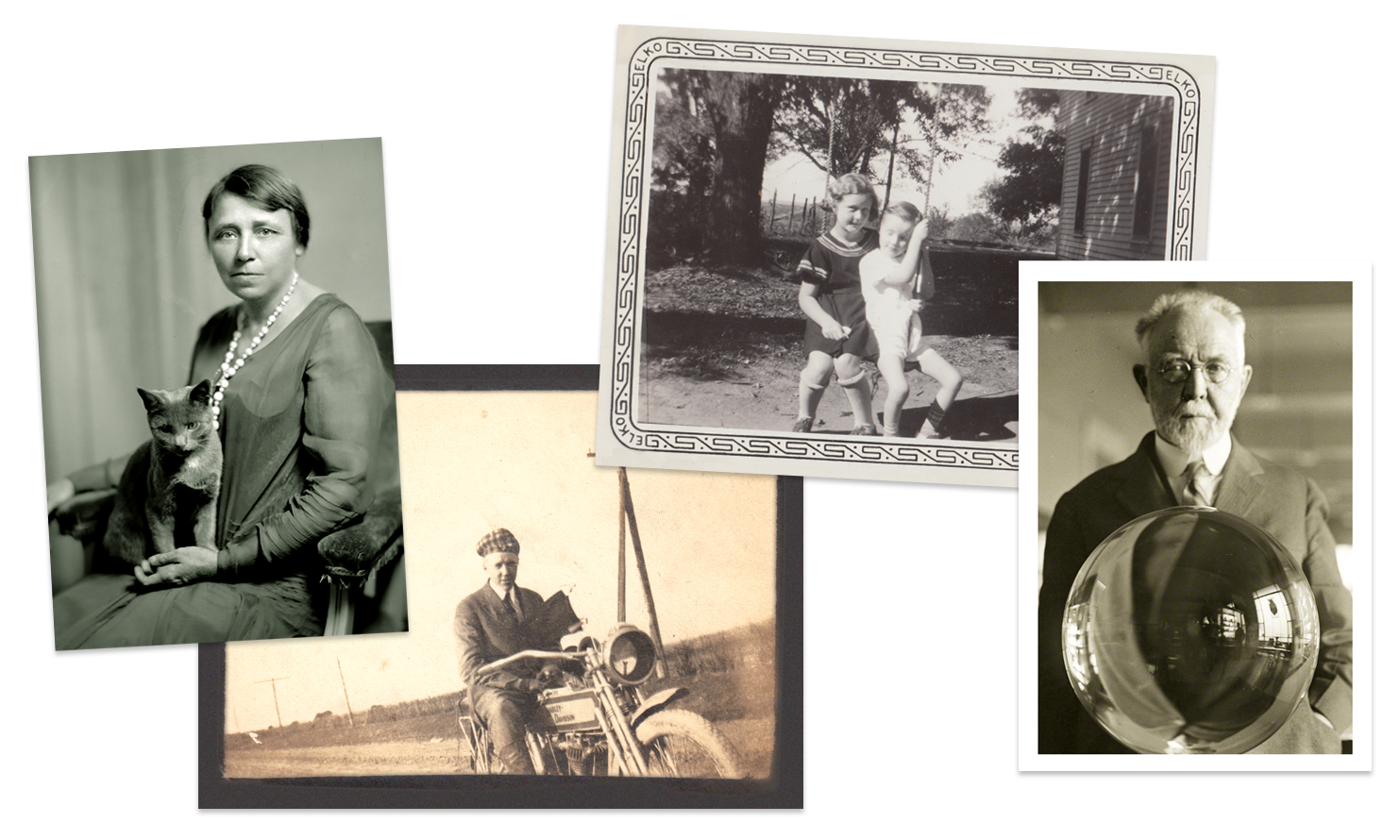 Lovecraft was fond of taking snapshots and frequently traded pictures with his friends, though we don't know whose picture he might have kept in his wallet....
Lovecraft was fond of taking snapshots and frequently traded pictures with his friends, though we don't know whose picture he might have kept in his wallet....
We are providing two snapshots in each Arkham Investigator's Wallet. One is of a nice lady with a cat on her lap. (Or maybe it's of a cat with a nice lady in the background.) (Or maybe it's not really a cat....) For "The Dog Walker" certain specific information should be written on the back of this photo, detailed in the game book.
The other snapshot will be a random choice of the three shown here. Who are they? That's for you to decide.
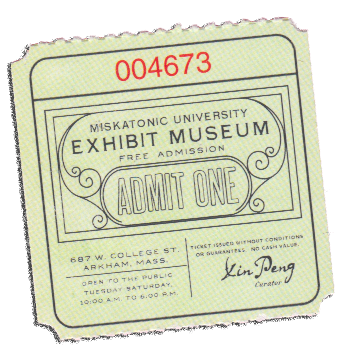 The M.U. Exhibit museum is full of fascinating stuff, only some of which is on public display. Admission is free, but they still give you a ticket and might ask to see it if you're causing trouble of any kind.
The M.U. Exhibit museum is full of fascinating stuff, only some of which is on public display. Admission is free, but they still give you a ticket and might ask to see it if you're causing trouble of any kind.
This prop is potentially useful as a clue if it proves a certain someone was actually at the museum at some point, so you might want to write a date or other suggestive information on the back. Or maybe it's a place to note an appointment with the curator, or a member of the Miskatonic faculty.
 Amelia Earhart may be the most remembered aviatrix of the 1920s and '30s, but she was far from the only one: Ruth Elder, Lady Heath, Beryl Markham, Hilda Hewlett, Ruth Law, Bessie Coleman, Katherine and Marjorie Stinson, Harriet Quimby and Neta Snook, to name just a handful, were some fascinating women.
Amelia Earhart may be the most remembered aviatrix of the 1920s and '30s, but she was far from the only one: Ruth Elder, Lady Heath, Beryl Markham, Hilda Hewlett, Ruth Law, Bessie Coleman, Katherine and Marjorie Stinson, Harriet Quimby and Neta Snook, to name just a handful, were some fascinating women.
Florence Harrington at the Arkham Airfield offers rides to up to two passengers at a time in her Rex Smith biplane. This ticket is based on a real one we found in an actual vintage wallet we got on eBay while researching this project. There's space on the back of the ticket to jot down who the passengers were and what kind of trip they took.
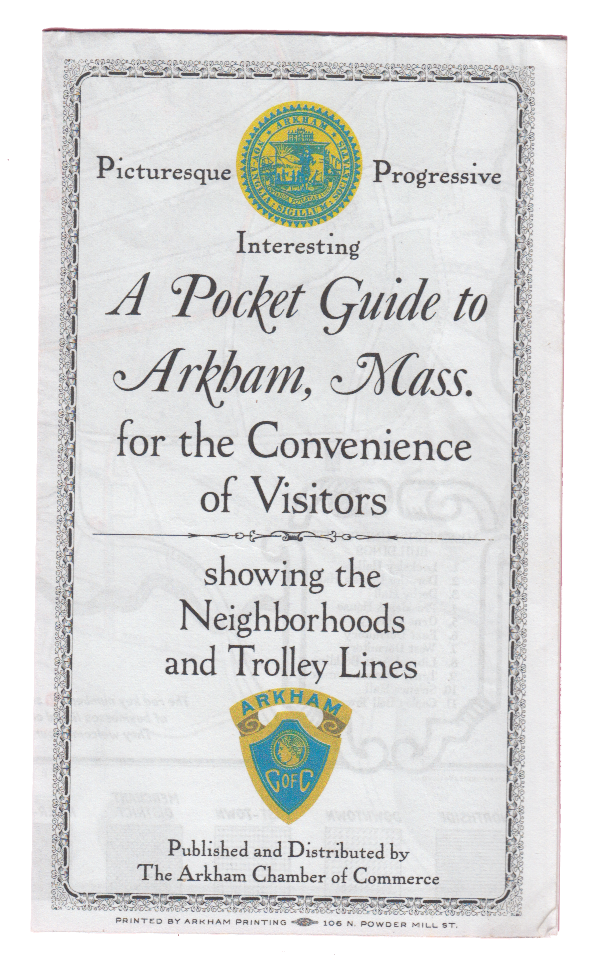 The Arkham Chamber of Commerce issues these handy little visitor guides to the city showing the neighborhoods and trolley lines. Local businesses that pay to advertise in the guide have their locations marked on the map to attract customers and get an edge on their competition. You can find the guides in stores, hotels, and newsstands all over town.
The Arkham Chamber of Commerce issues these handy little visitor guides to the city showing the neighborhoods and trolley lines. Local businesses that pay to advertise in the guide have their locations marked on the map to attract customers and get an edge on their competition. You can find the guides in stores, hotels, and newsstands all over town.
 When boarding any Arkham trolley car, if you pay with a token, or an extra penny, you can request a transfer that will let you board any other trolley car from a different line within a certain time period. The conductor has a pad full of these transfers and tears one off the pad at an angle to show at what time the transfer expires (usually an hour from when it was issued), and punches a hole along the edge to show where the transfer was issued. For example, the transfer shown here expires at 2:30 PM and was issued at the corner of W. Curwen and Brown Sts. Each transfer also has the date it was issued written on it. This makes it a very handy record of someone's trip, and consequently a potentially useful clue if you're trying to trace someone's movements. Or maybe you're keeping it in the hope of cashing in on the coupon book advertised on the back. Or use it as a bookmark!
When boarding any Arkham trolley car, if you pay with a token, or an extra penny, you can request a transfer that will let you board any other trolley car from a different line within a certain time period. The conductor has a pad full of these transfers and tears one off the pad at an angle to show at what time the transfer expires (usually an hour from when it was issued), and punches a hole along the edge to show where the transfer was issued. For example, the transfer shown here expires at 2:30 PM and was issued at the corner of W. Curwen and Brown Sts. Each transfer also has the date it was issued written on it. This makes it a very handy record of someone's trip, and consequently a potentially useful clue if you're trying to trace someone's movements. Or maybe you're keeping it in the hope of cashing in on the coupon book advertised on the back. Or use it as a bookmark!
We have provided one transfer in the wallet for you to tear, punch and date as you see fit. You can get more transfers, including from the other Arkham trolley lines, in the original HPLHS Prop Documents Collection.
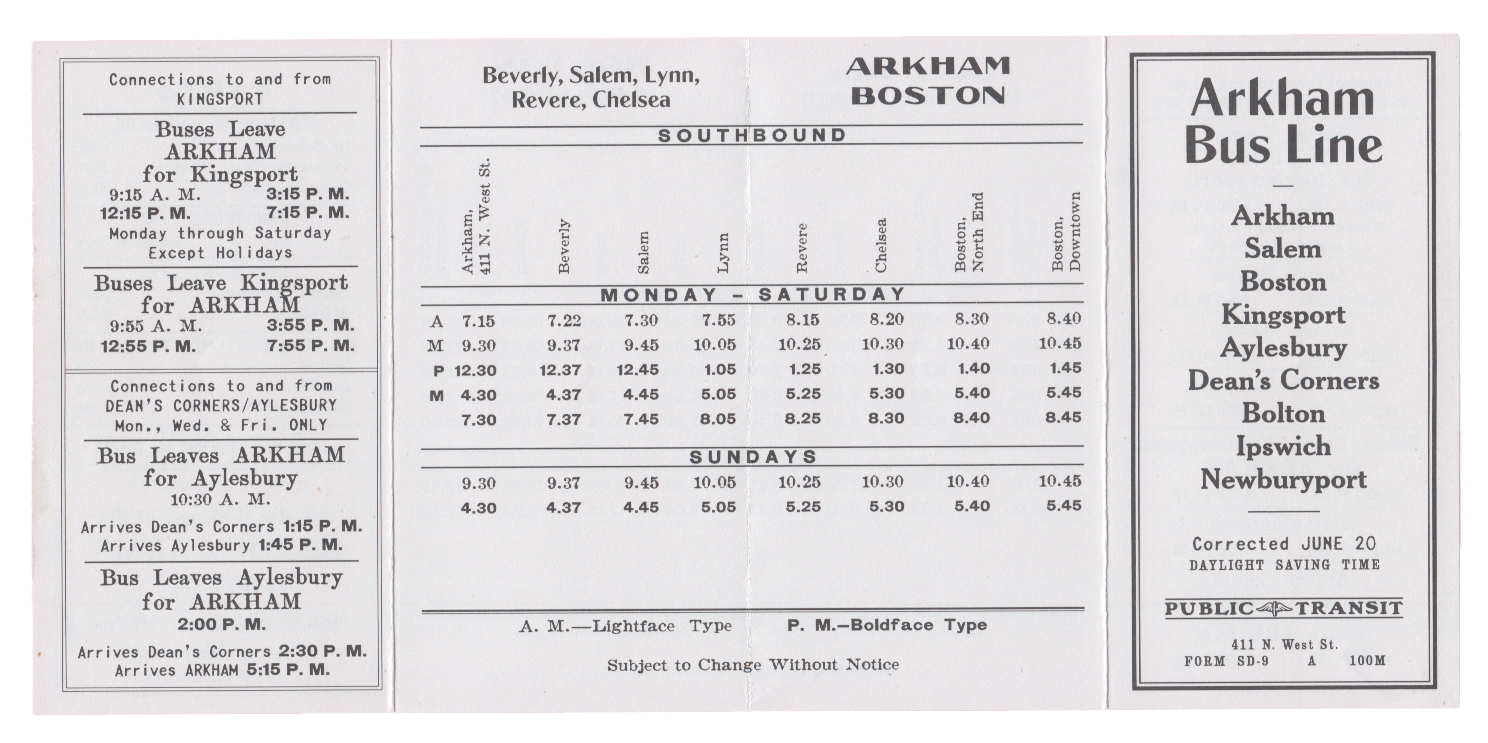 For getting around within the city, you will want to take an Arkham trolley car. But if you want to get from Arkham to other towns in the region, you can hop aboard an Arkham Bus Line coach. These timetables are provided for free thanks to the sponsorship of local business who buy ad space.
For getting around within the city, you will want to take an Arkham trolley car. But if you want to get from Arkham to other towns in the region, you can hop aboard an Arkham Bus Line coach. These timetables are provided for free thanks to the sponsorship of local business who buy ad space.
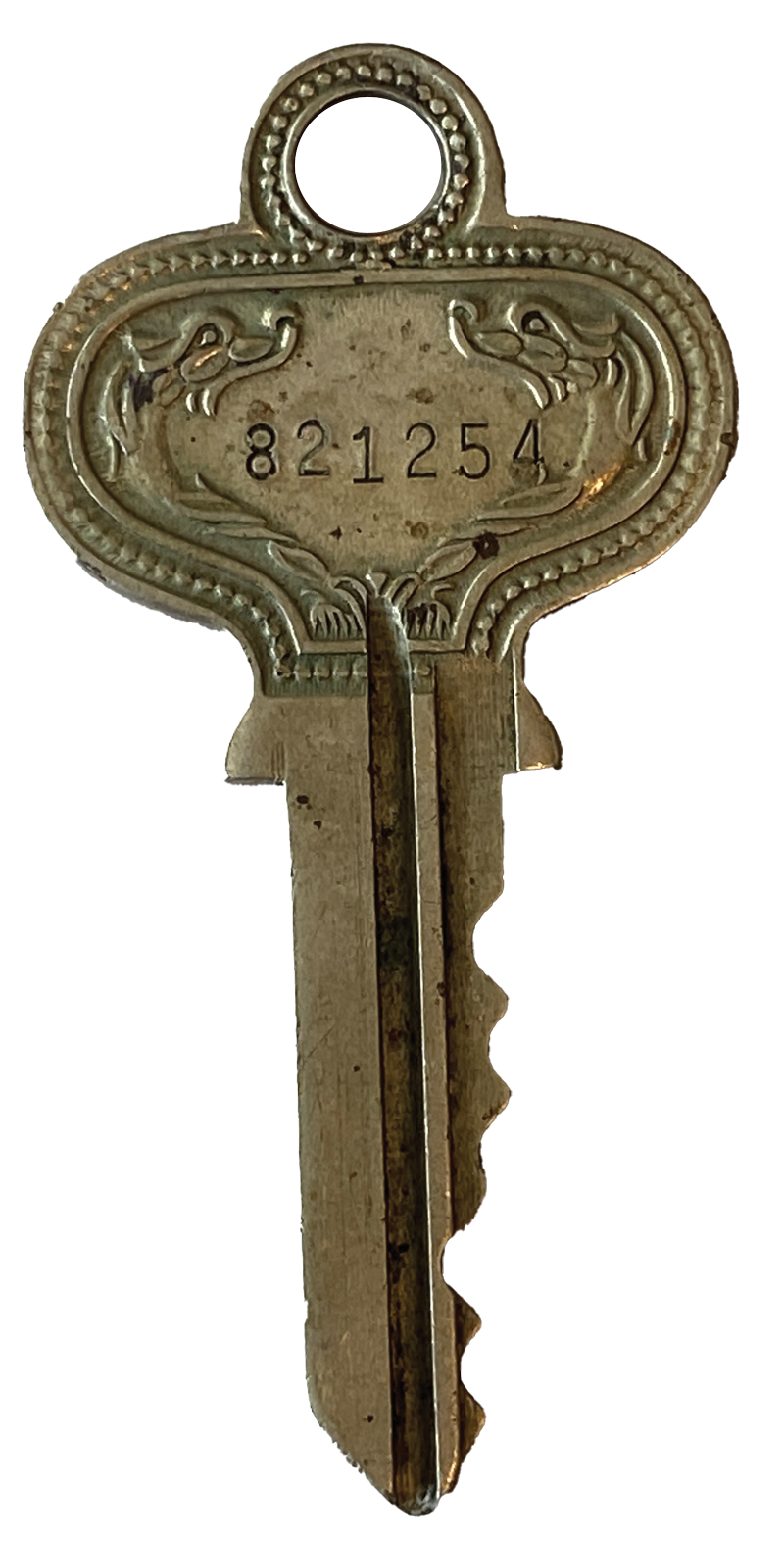 The zippered change compartment in each Arkham Investigator's Wallet contains an actual vintage key. It has a specific use in "The Dog Walker", detailed in the game book. But beyond that it could open any number of doors, or cabinets, or briefcases, or safe deposit boxes, or gates, or anything that you should decide. Every key is randomly selected and the one shown here is just an example. Yours will look different.
The zippered change compartment in each Arkham Investigator's Wallet contains an actual vintage key. It has a specific use in "The Dog Walker", detailed in the game book. But beyond that it could open any number of doors, or cabinets, or briefcases, or safe deposit boxes, or gates, or anything that you should decide. Every key is randomly selected and the one shown here is just an example. Yours will look different.
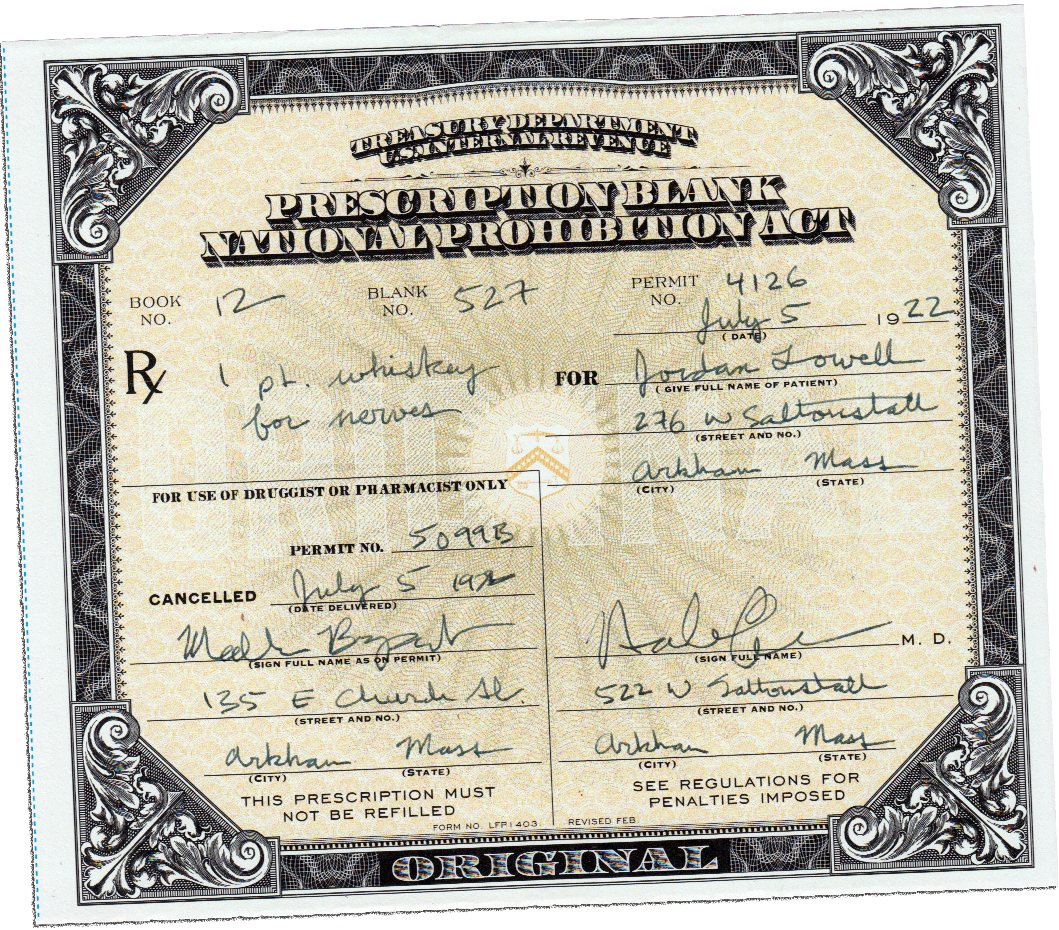 Prohibition was in effect in the US from 1920 to 1933, and if you wanted to legally get a drink of alcohol during that period, you'd need to get a doctor to prescribe it. The US government issued very elaborate pads for doctors to use to write such prescriptions, and here's a page from one. We've left the one in the wallet blank for you to fill out yourself, but you can see here the kind of information that should be provided. As everyone knows, Prohibition worked out very well and there was never any fraud or shenanigans of any kind perpetrated by doctors or pharmacists with these prescription blanks.
Prohibition was in effect in the US from 1920 to 1933, and if you wanted to legally get a drink of alcohol during that period, you'd need to get a doctor to prescribe it. The US government issued very elaborate pads for doctors to use to write such prescriptions, and here's a page from one. We've left the one in the wallet blank for you to fill out yourself, but you can see here the kind of information that should be provided. As everyone knows, Prohibition worked out very well and there was never any fraud or shenanigans of any kind perpetrated by doctors or pharmacists with these prescription blanks.
Fighting the forces of the Mythos really requires steady nerves, so you can, of course, visit the URL shown on the read-me card that came with your wallet to download and print more alcohol prescription blanks.
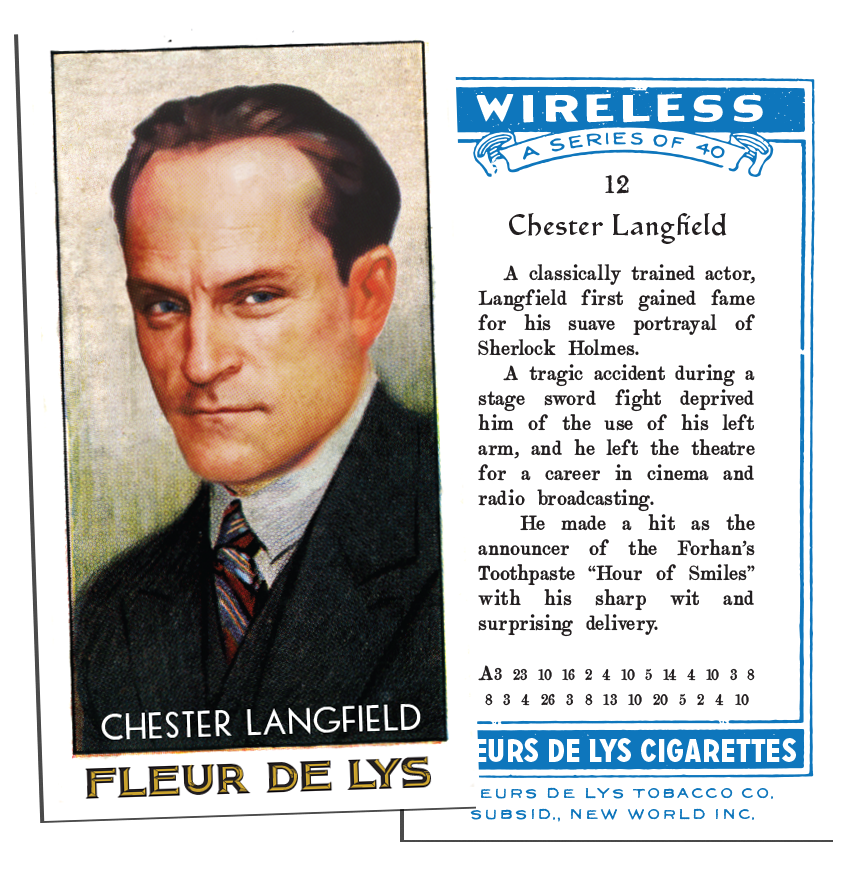 Starting in the mid-1870s, tobacco companies used to include little pieces of cardboard to stiffen cigarette packs and prevent damaging their contents, and some genius realized you could print advertising on them. Maybe that same genius realized if you included a picture of a popular athlete, celebrity, sailing ship or cute animal you could make the cards collectible and drive tobacco sales. From 1875 until about 1940, cigarette cards were a very common little bonus in lots of tobacco brands.
Starting in the mid-1870s, tobacco companies used to include little pieces of cardboard to stiffen cigarette packs and prevent damaging their contents, and some genius realized you could print advertising on them. Maybe that same genius realized if you included a picture of a popular athlete, celebrity, sailing ship or cute animal you could make the cards collectible and drive tobacco sales. From 1875 until about 1940, cigarette cards were a very common little bonus in lots of tobacco brands.
We thought it would be fun to include a card from Fleurs de Lys cigarettes, which will be well known to listeners of Dark Adventure Radio Theatre®. Pictured is charismatic host Chester Langfield, as played by Noah Wagner.
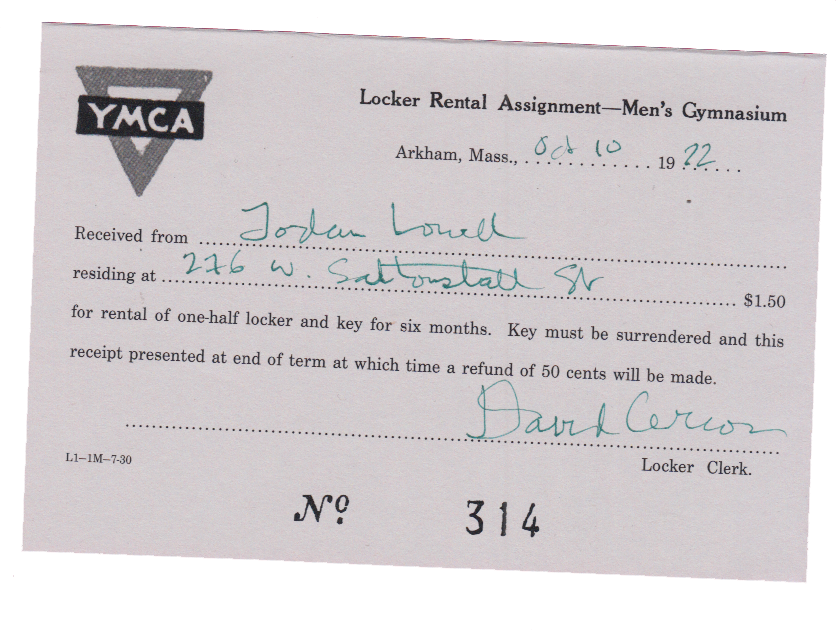 Lovecraft often stayed at the YMCA when he went on trips because it was so affordable, and they could be a useful place to hide out, store things, and who knows what else.
Lovecraft often stayed at the YMCA when he went on trips because it was so affordable, and they could be a useful place to hide out, store things, and who knows what else.
This locker receipt is left blank for you to fill out as you see fit. If you want to play "The Dog Walker" it should be customized according to details in the game book. You can download replacement blanks at the URL shown on the read-me card that came with your wallet.
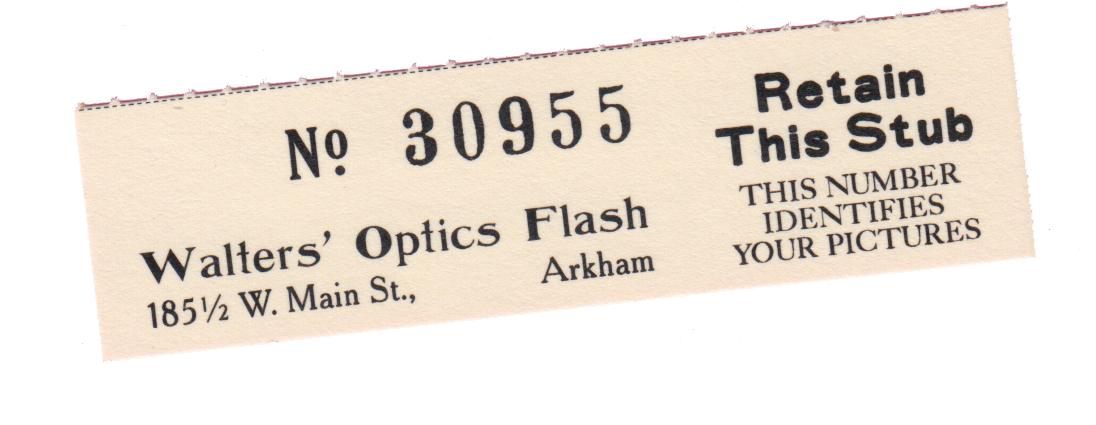 This item is based on a real claim check we found in a vintage wallet we acquired on eBay while researching this project. Walters' Optics is the store in Arkham that sells cameras, and they also develop film. That's the "flash" service. To heighten its value as a clue, you could jot down on the back what the pictures in question are of.
This item is based on a real claim check we found in a vintage wallet we acquired on eBay while researching this project. Walters' Optics is the store in Arkham that sells cameras, and they also develop film. That's the "flash" service. To heighten its value as a clue, you could jot down on the back what the pictures in question are of.
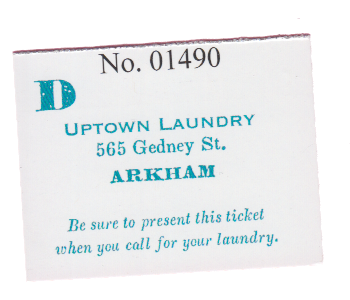 The French were using turpentine to do dry cleaning in the 1700s, and it's been a thing in the US since at least 1821, when entrepreneur Thomas L. Jennings became the first African-American patent holder in history for his new and improved method of "dry scouring".
The French were using turpentine to do dry cleaning in the 1700s, and it's been a thing in the US since at least 1821, when entrepreneur Thomas L. Jennings became the first African-American patent holder in history for his new and improved method of "dry scouring".
Uptown Laundry, conveniently located in the Northside neighborhood, will clean your clothes in 48 hours, or 24 if you pay a rush charge. Mrs. Briry has probably seen a lot of stains she cannot begin to explain, and has no doubt learned to keep her mouth shut. There is space on the back to write down specific items of clothing left for cleaning to enhance its value as a clue.
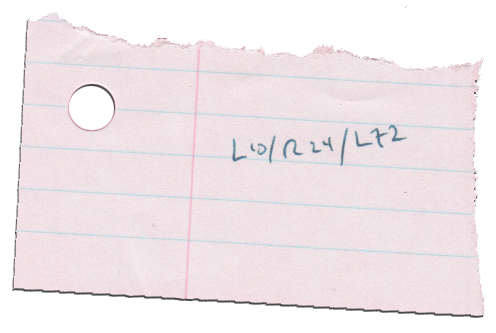 This little scrap of notebook paper contains what appears to be the combination to a lock. Is it a locker? A safe? A combination padlock? That's for you to decide, or deduce. Members of the Dark Adventure Decoder Club might find the numbers on this paper to mean something else entirely....
This little scrap of notebook paper contains what appears to be the combination to a lock. Is it a locker? A safe? A combination padlock? That's for you to decide, or deduce. Members of the Dark Adventure Decoder Club might find the numbers on this paper to mean something else entirely....
 There are competing claims to who invented the fortune cookie and when. Although there was a kind of Japanese version of a fortune cookie in the 19th century, it seems that modern fortune cookies were first developed in San Francisco in the 1890s. Each Arkham Investigator's Wallet comes with one fortune cookie fortune, selected at random from dozens of possibilities. We think it might be from the Flying Squid Chop Suey House on the Lower Southside, but we haven't been able to find it on the map.
There are competing claims to who invented the fortune cookie and when. Although there was a kind of Japanese version of a fortune cookie in the 19th century, it seems that modern fortune cookies were first developed in San Francisco in the 1890s. Each Arkham Investigator's Wallet comes with one fortune cookie fortune, selected at random from dozens of possibilities. We think it might be from the Flying Squid Chop Suey House on the Lower Southside, but we haven't been able to find it on the map.
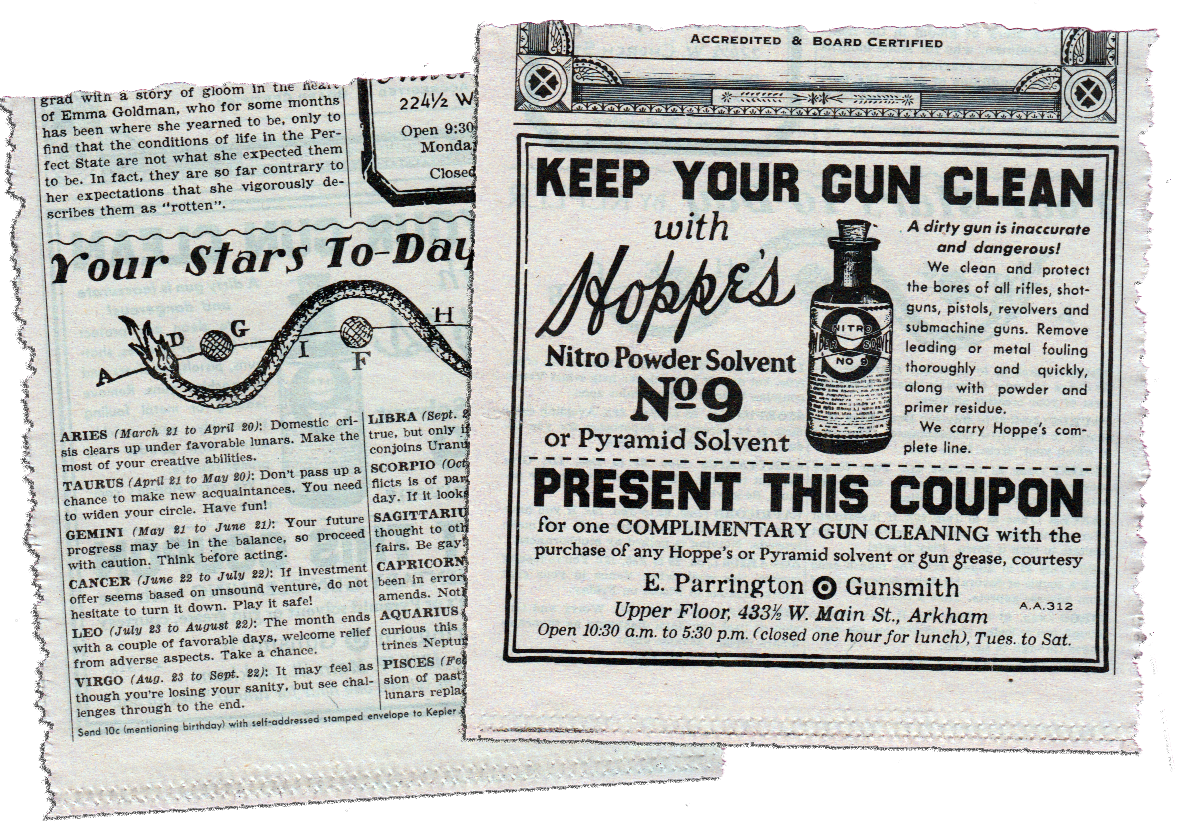 This newspaper clipping has potentially useful information on both sides. Maybe it's been clipped because of the handy gun cleaning coupon. (At the Keeper's discretion this coupon could increase your chances in a firefight.) Or maybe it's been clipped because of the horoscope column.
This newspaper clipping has potentially useful information on both sides. Maybe it's been clipped because of the handy gun cleaning coupon. (At the Keeper's discretion this coupon could increase your chances in a firefight.) Or maybe it's been clipped because of the horoscope column.
The first nationally syndicated horoscope columns began to appear in 1916, but they usually focused on the horoscope of a famous person. The anonymous 12-paragraph horoscope, with a vaguely optimistic prediction for every astrological sign, didn't really appear nationally until 1933. But we think that the Arkham Advertiser might have started the trend and published its own home-grown column. No one knows who the "Kepler" of the byline really is, but some speculate it is a member of the Miskatonic astronomy faculty making an extra buck on the side.
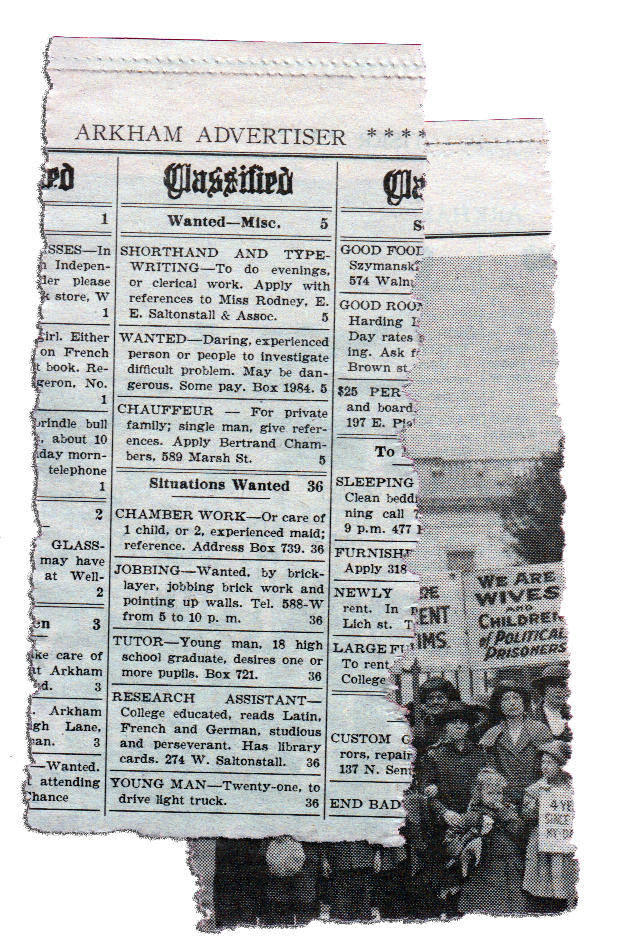 When Andrew Leman ran his first-ever game of Cthulhu Lives! almost forty years ago, he started it by placing an actual classified ad in the Denver Post, never dreaming that anyone but the players would actually answer it. Much to his surprise—and his parents' irritation—dozens of random strangers called his house at all hours for days, wanting more information about this "difficult, dangerous problem". This newspaper clipping features a replica of that advertisement (minus the phone number), along with one or two others that might be the start of an interesting adventure.
When Andrew Leman ran his first-ever game of Cthulhu Lives! almost forty years ago, he started it by placing an actual classified ad in the Denver Post, never dreaming that anyone but the players would actually answer it. Much to his surprise—and his parents' irritation—dozens of random strangers called his house at all hours for days, wanting more information about this "difficult, dangerous problem". This newspaper clipping features a replica of that advertisement (minus the phone number), along with one or two others that might be the start of an interesting adventure.
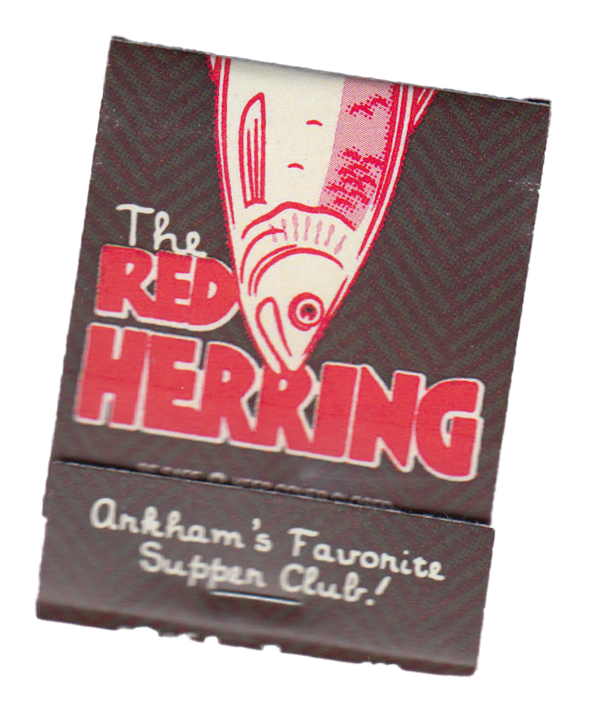 Matches always come in handy, and we thought it would be fun to include some in the wallet, so we invented a new Arkham supper club for the purpose. We left the inside cover mostly white so you could write down a name, phone number, or other clue as you see fit.
Matches always come in handy, and we thought it would be fun to include some in the wallet, so we invented a new Arkham supper club for the purpose. We left the inside cover mostly white so you could write down a name, phone number, or other clue as you see fit.
The regulations regarding matchbook printing have gotten much stricter since Lovecraft's day, and certain anachronistic safety language is now required to appear just so, no matter how much you ask them to use your custom vintage font. Those matchbook printers have no sense of humor.
You can find matchbooks from other Arkham businesses that you can print yourself in the original HPLHS Prop Documents Collection.
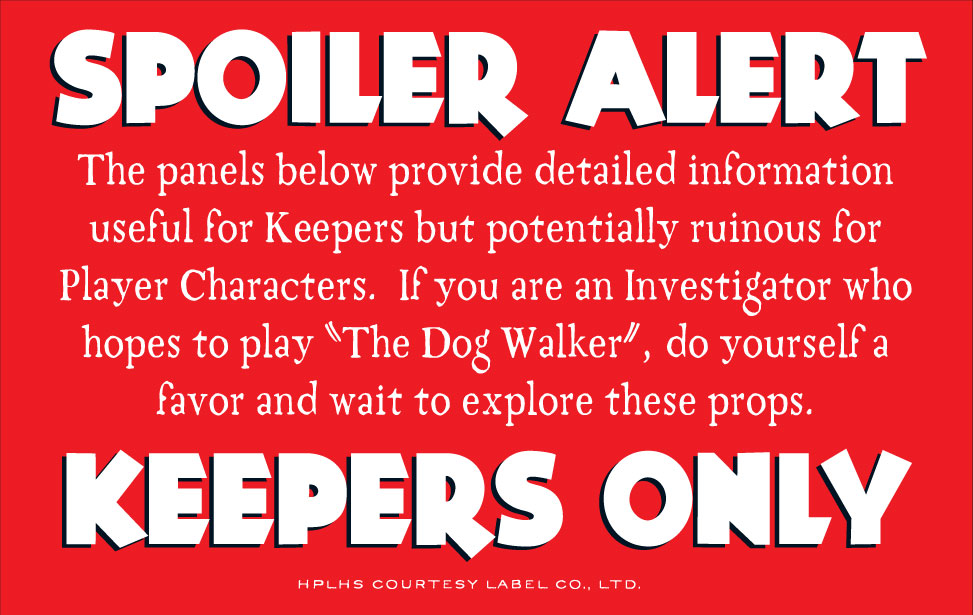 This wallet can enhance any game set in or around Arkham, but we have created a custom adventure designed to accompany the prop set, "The Dog Walker". It can be played either as a traditional Call of Cthulhu adventure, or in "solo player" mode. The adventure book comes with the physical wallet, and there are two additional props included specifically for this game. They are not packed into the wallet itself, but under it.
This wallet can enhance any game set in or around Arkham, but we have created a custom adventure designed to accompany the prop set, "The Dog Walker". It can be played either as a traditional Call of Cthulhu adventure, or in "solo player" mode. The adventure book comes with the physical wallet, and there are two additional props included specifically for this game. They are not packed into the wallet itself, but under it.
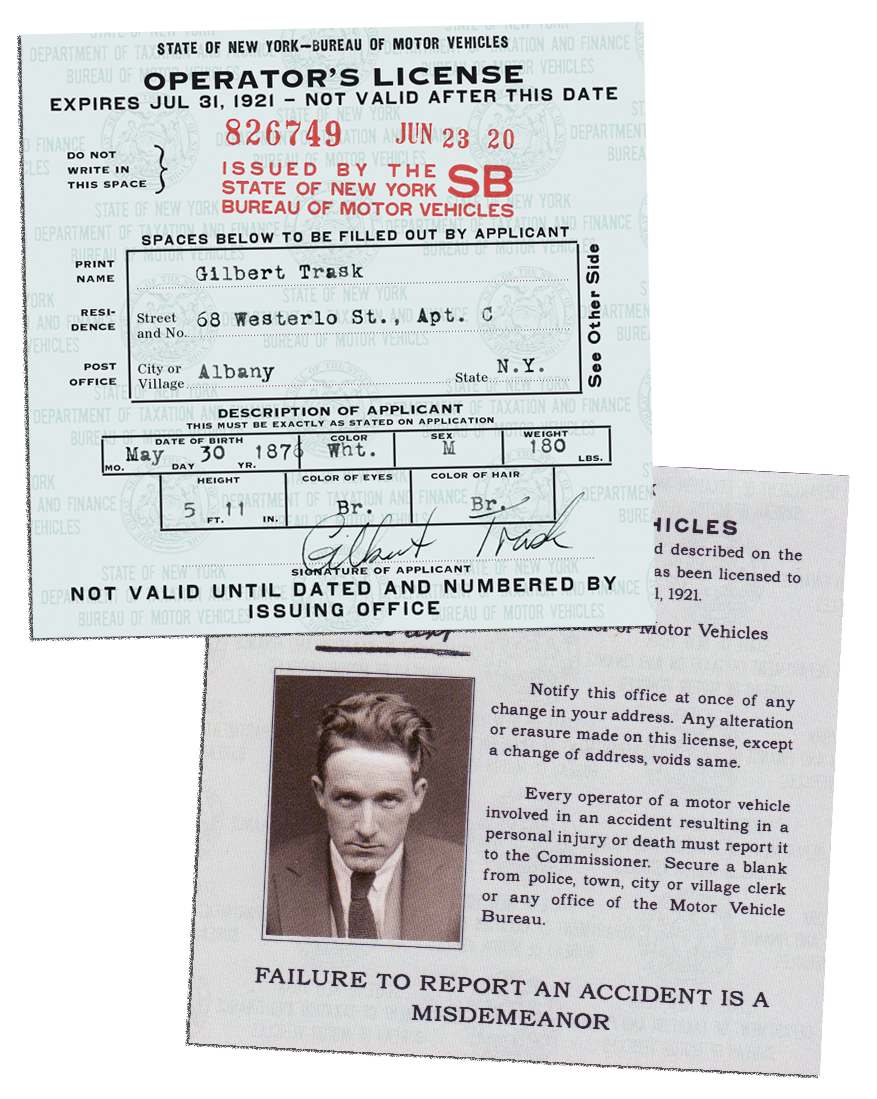 This replica New York diver's license is specifically for use with "The Dog Walker" adventure. You should take the Massachusetts driver's license out of the wallet and replace it with this one. Give it a good crumpling to make it look like it's been in there for years.
This replica New York diver's license is specifically for use with "The Dog Walker" adventure. You should take the Massachusetts driver's license out of the wallet and replace it with this one. Give it a good crumpling to make it look like it's been in there for years.
It is an important clue for a few reasons. It gives the Investigators a clear picture of what Trask looks like, and shows his original Albany address. It also shows his signature from before his personality change, which can give them the idea that he is somehow different now than he was before.
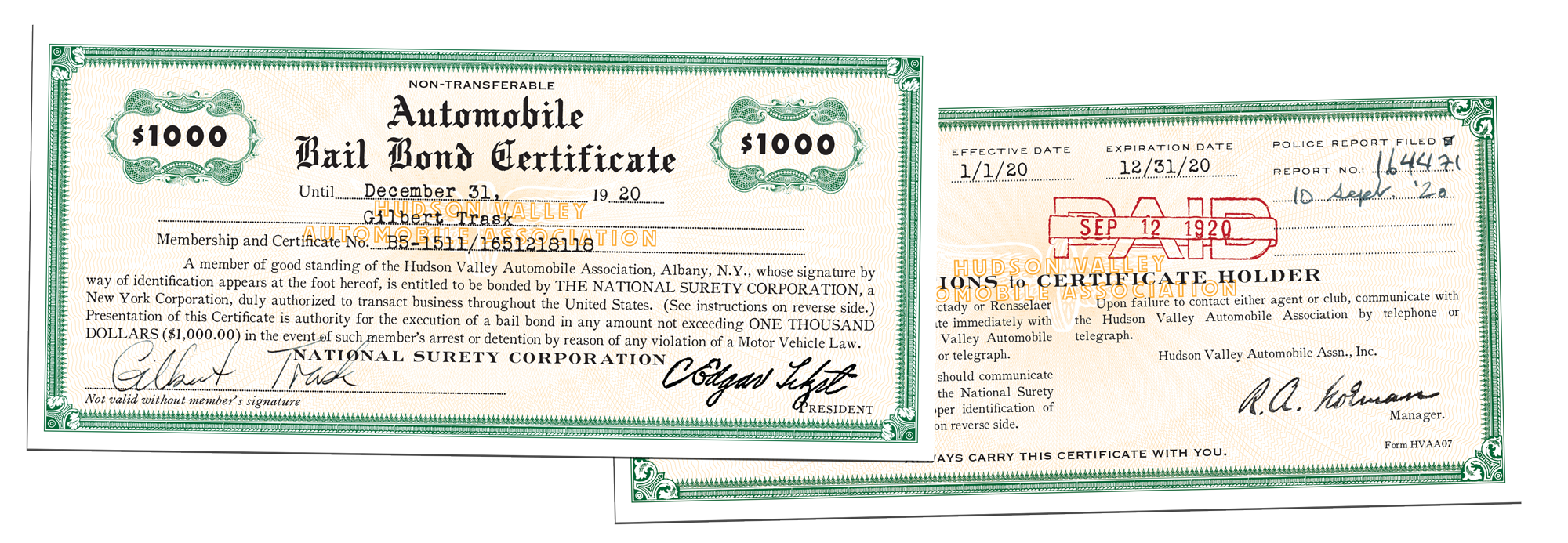 This is essentially a get-out-of-jail free card, paid for by Tartaglia crime family and issued to all the truck drivers in their employ. If they ever get arrested while on the job, they can use this certificate to stay out of jail while they wait for their mob lawyers to fix things.
This is essentially a get-out-of-jail free card, paid for by Tartaglia crime family and issued to all the truck drivers in their employ. If they ever get arrested while on the job, they can use this certificate to stay out of jail while they wait for their mob lawyers to fix things.
This prop is important in the game because it gives Investigators a way to learn about Trask's criminal past. Note also that the Trask signatures on both his driver's license and this bond certificate are identical. Since you will be signing Gilbert Trask's name on other props, the identical signatures on these two documents is a subtle clue that Trask's personality has changed since the days he lived in Albany. When you sign other props with Trask's name, make no effort to make them match these signatures.
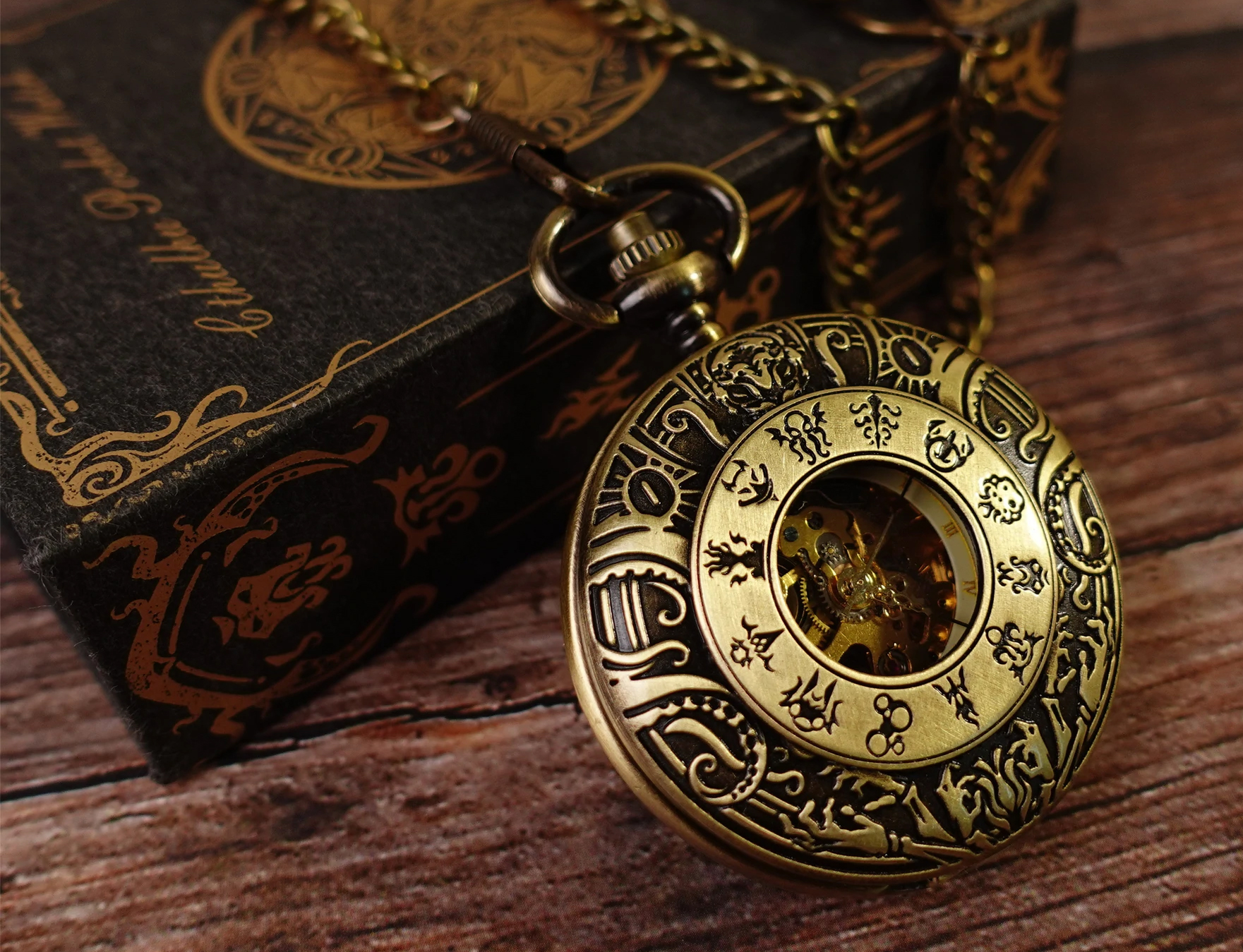 Trask pawns a special pocket watch at the Diamond Credit Agency as a signal to the Timekeepers that he needs their assistance. It's not at all necessary, but if you have any desire to bring even more prop realism into your game, you can get one of these watches from our online store! They're pretty neat.
Trask pawns a special pocket watch at the Diamond Credit Agency as a signal to the Timekeepers that he needs their assistance. It's not at all necessary, but if you have any desire to bring even more prop realism into your game, you can get one of these watches from our online store! They're pretty neat.
